2012版中考一轮复习精品课件人教版英语八年级下册(5课时152张ppt)
文档属性
| 名称 | 2012版中考一轮复习精品课件人教版英语八年级下册(5课时152张ppt) | 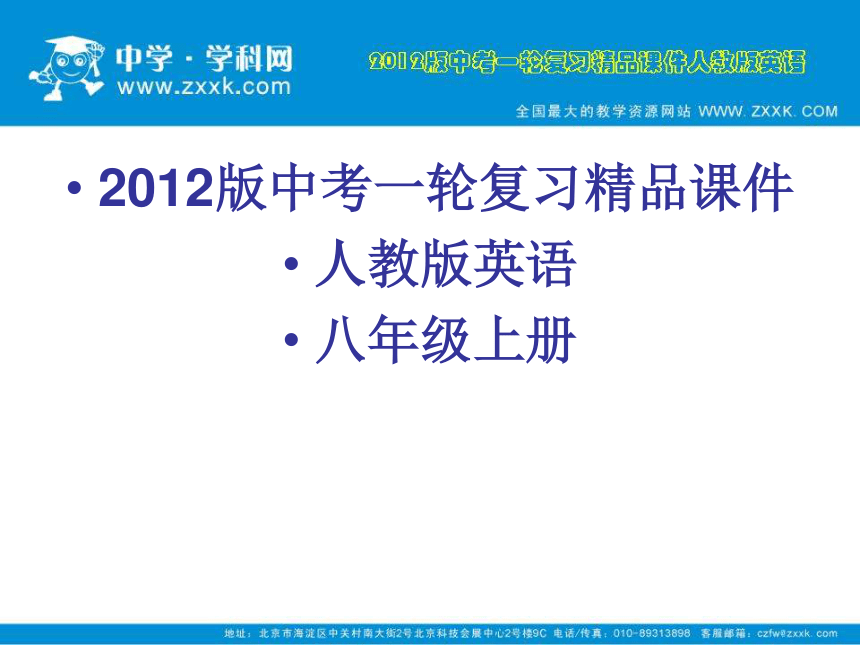 | |
| 格式 | rar | ||
| 文件大小 | 1.0MB | ||
| 资源类型 | 教案 | ||
| 版本资源 | 通用版 | ||
| 科目 | 英语 | ||
| 更新时间 | 2012-01-16 21:24:07 | ||
图片预览

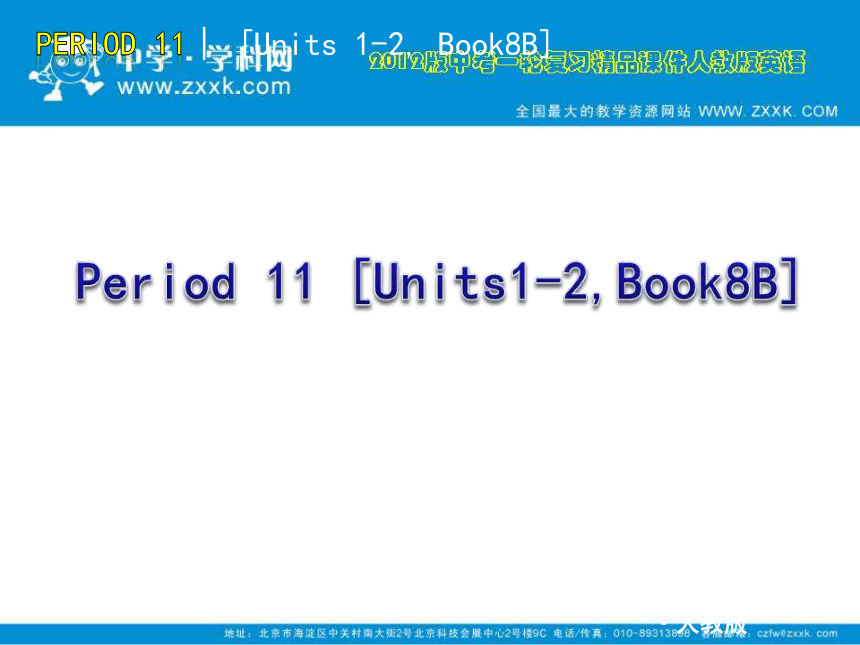
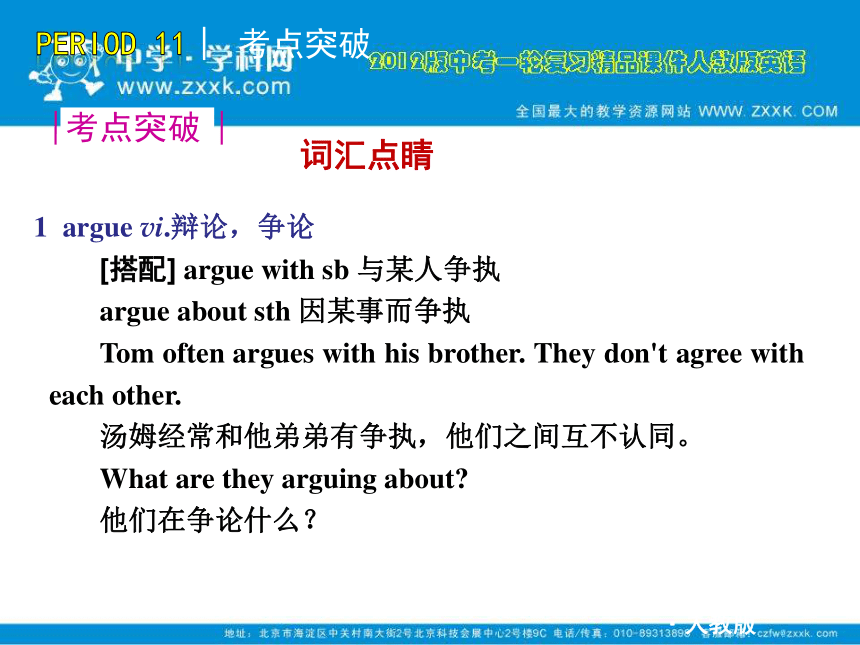
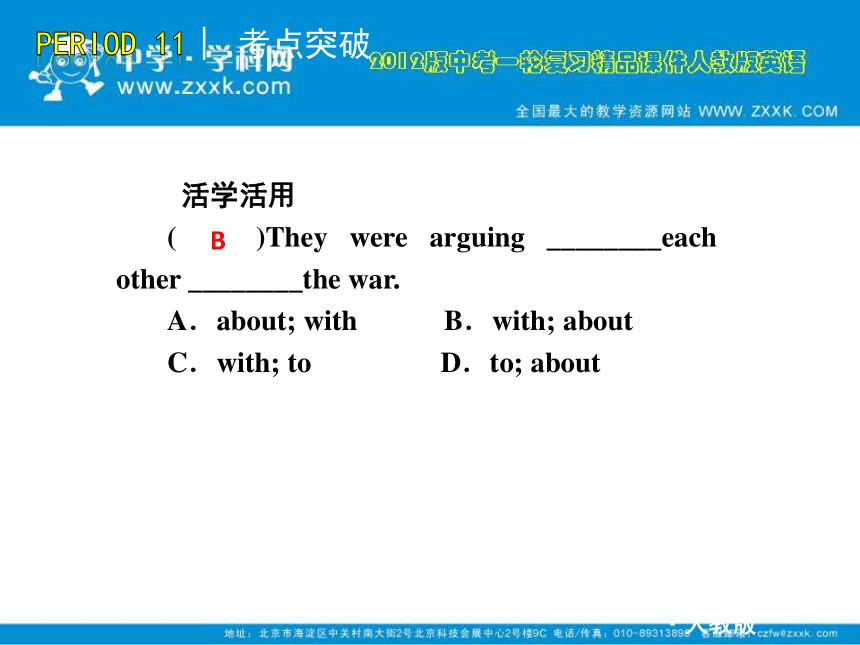
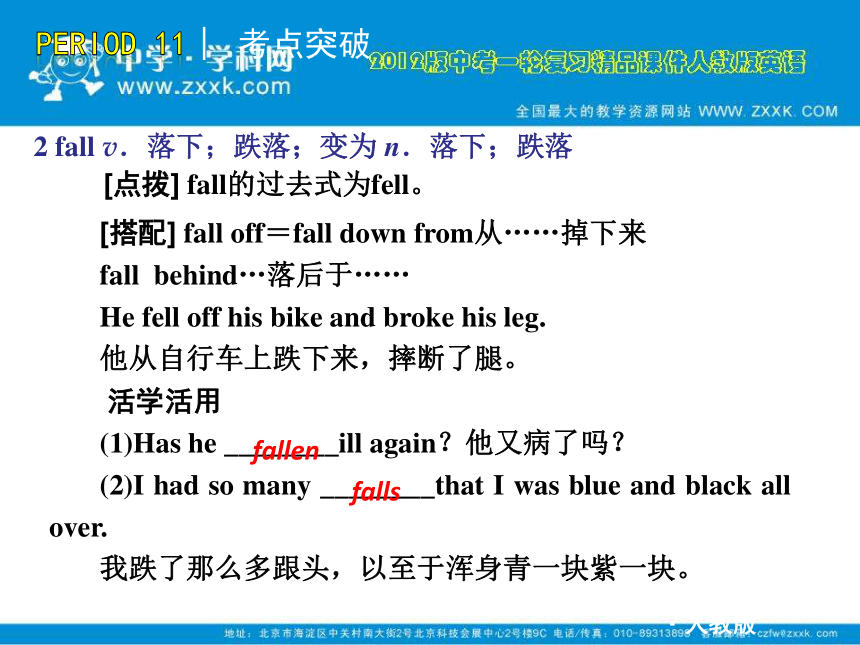
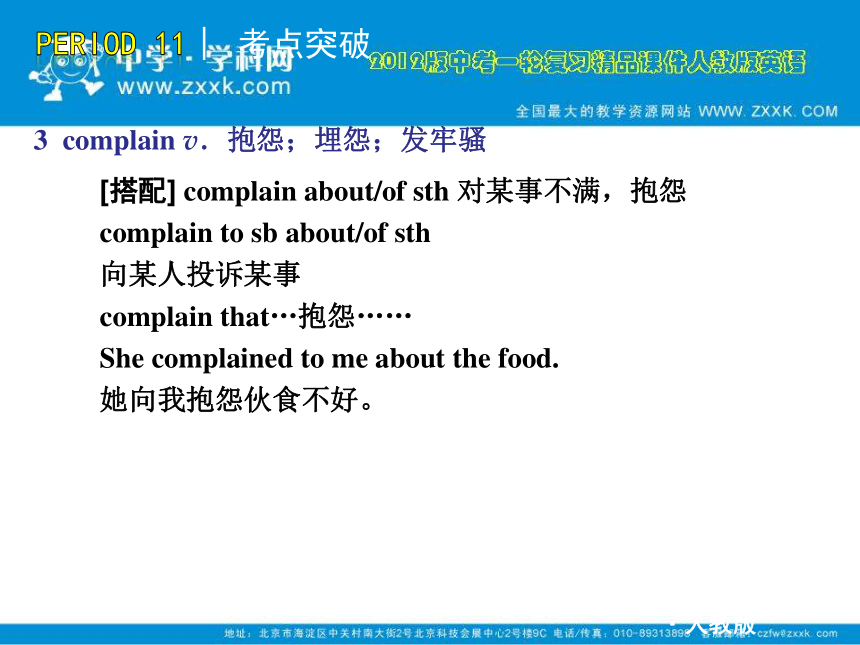
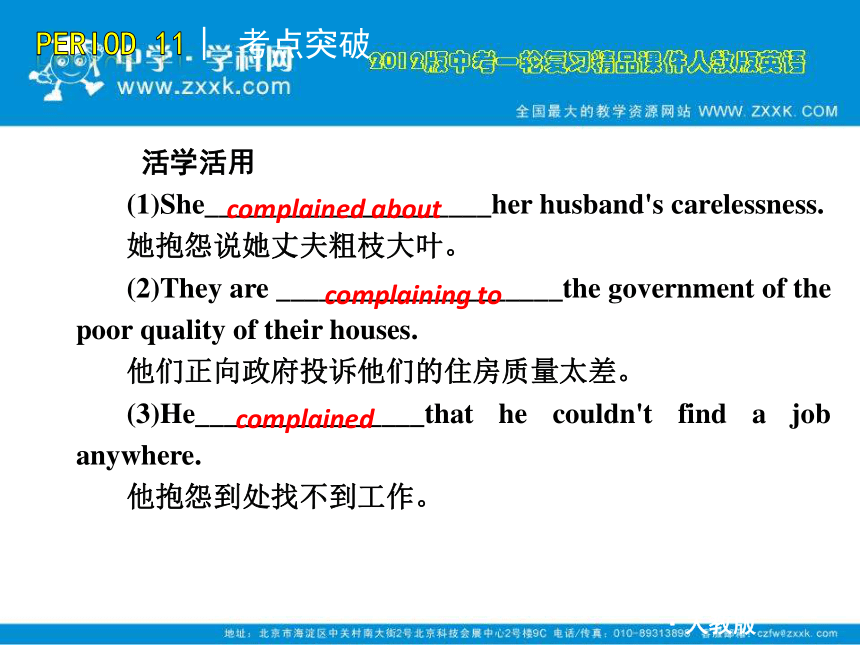
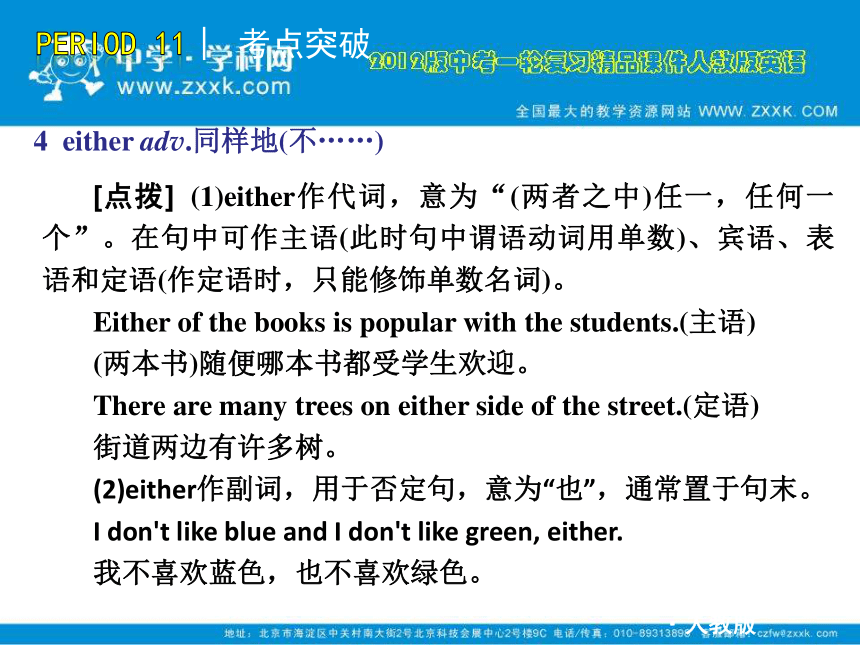
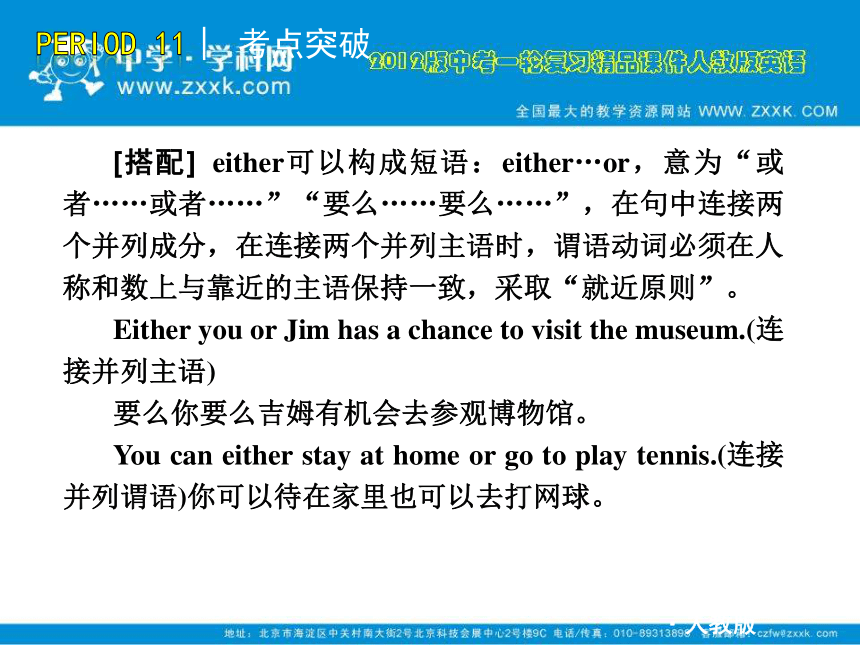
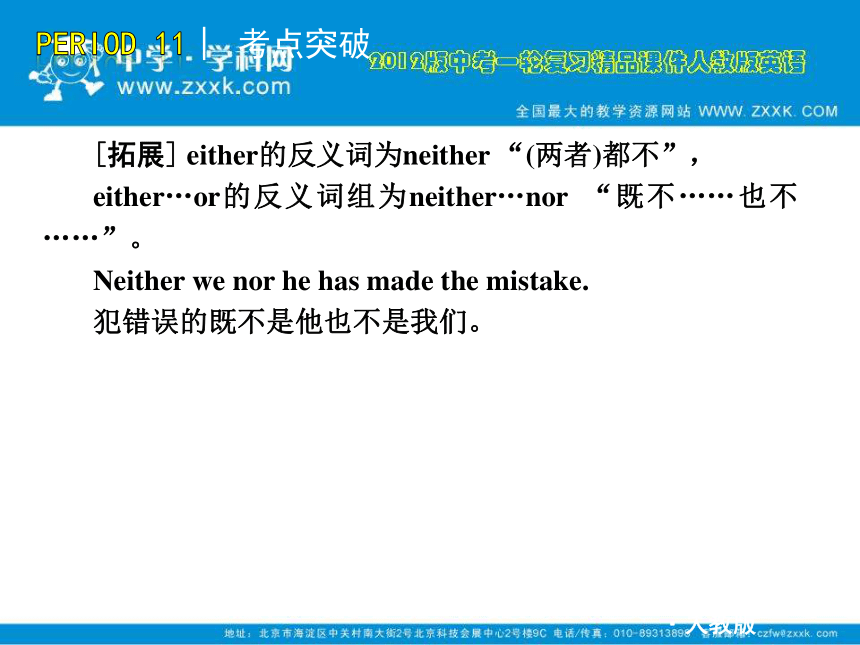
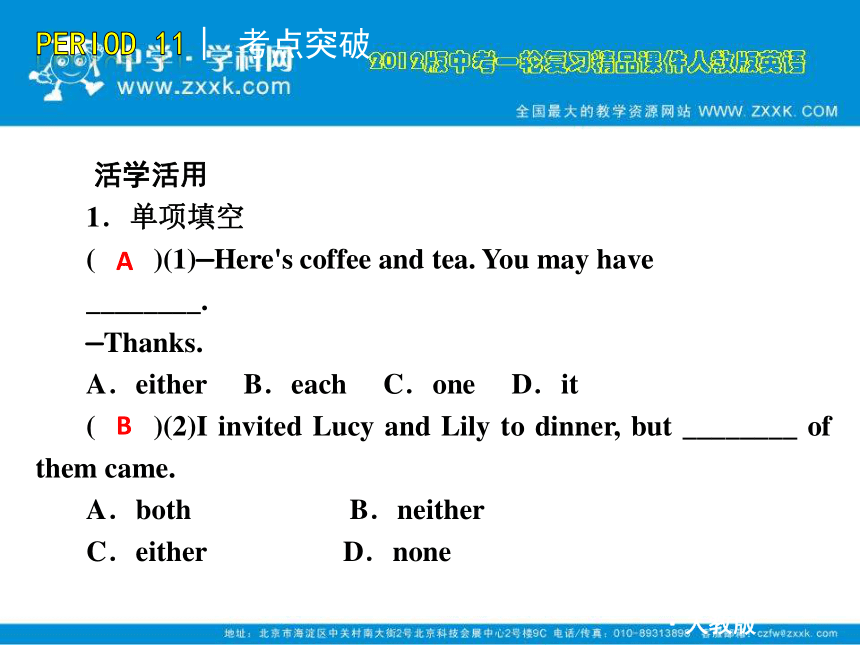
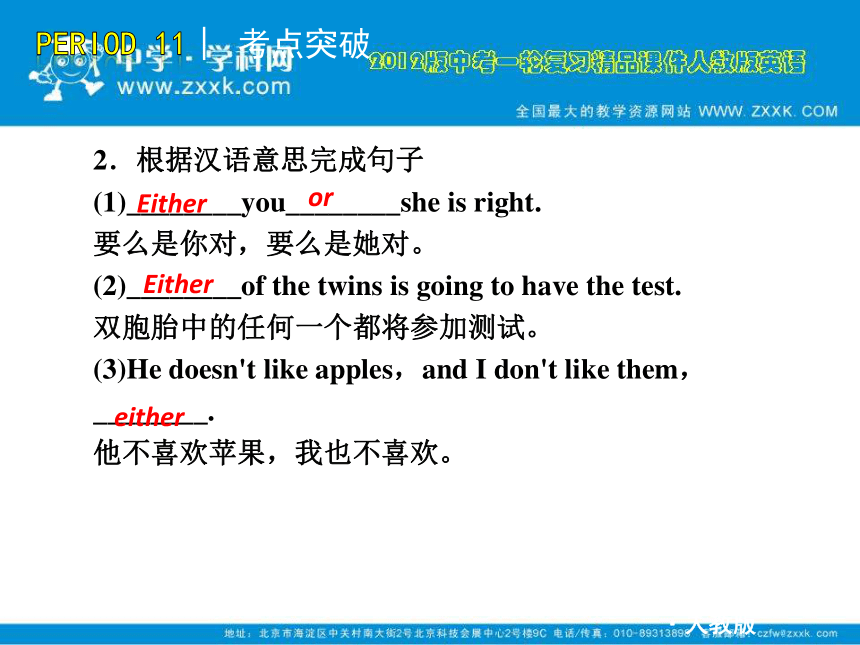
文档简介
(共152张PPT)
2012版中考一轮复习精品课件
人教版英语
八年级上册
·人教版
考点突破
·人教版
词汇点睛
1 argue vi.辩论,争论
[搭配] argue with sb 与某人争执
argue about sth 因某事而争执
Tom often argues with his brother. They don't agree with each other.
汤姆经常和他弟弟有争执,他们之间互不认同。
What are they arguing about
他们在争论什么?
·人教版
活学活用
( )They were arguing ________each other ________the war.
A.about; with B.with; about
C.with; to D.to; about
B
·人教版
2 fall v.落下;跌落;变为 n.落下;跌落
[点拨] fall的过去式为fell。
[搭配] fall off=fall down from从……掉下来
fall behind…落后于……
He fell off his bike and broke his leg.
他从自行车上跌下来,摔断了腿。
活学活用
(1)Has he ________ill again?他又病了吗?
(2)I had so many ________that I was blue and black all over.
我跌了那么多跟头,以至于浑身青一块紫一块。
fallen
falls
·人教版
3 complain v.抱怨;埋怨;发牢骚
[搭配] complain about/of sth 对某事不满,抱怨
complain to sb about/of sth
向某人投诉某事
complain that…抱怨……
She complained to me about the food.
她向我抱怨伙食不好。
·人教版
活学活用
(1)She____________________her husband's carelessness.
她抱怨说她丈夫粗枝大叶。
(2)They are ____________________the government of the poor quality of their houses.
他们正向政府投诉他们的住房质量太差。
(3)He________________that he couldn't find a job anywhere.
他抱怨到处找不到工作。
complained about
complaining to
complained
·人教版
4 either adv.同样地(不……)
[点拨] (1)either作代词,意为“(两者之中)任一,任何一个”。在句中可作主语(此时句中谓语动词用单数)、宾语、表语和定语(作定语时,只能修饰单数名词)。
Either of the books is popular with the students.(主语)
(两本书)随便哪本书都受学生欢迎。
There are many trees on either side of the street.(定语)
街道两边有许多树。
(2)either作副词,用于否定句,意为“也”,通常置于句末。
I don't like blue and I don't like green, either.
我不喜欢蓝色,也不喜欢绿色。
·人教版
[搭配] either可以构成短语:either…or,意为“或者……或者……”“要么……要么……”,在句中连接两个并列成分,在连接两个并列主语时,谓语动词必须在人称和数上与靠近的主语保持一致,采取“就近原则”。
Either you or Jim has a chance to visit the museum.(连接并列主语)
要么你要么吉姆有机会去参观博物馆。
You can either stay at home or go to play tennis.(连接并列谓语)你可以待在家里也可以去打网球。
·人教版
[拓展] either的反义词为neither “(两者)都不”,
either…or的反义词组为neither…nor “既不……也不……”。
Neither we nor he has made the mistake.
犯错误的既不是他也不是我们。
·人教版
活学活用
1.单项填空
( )(1)—Here's coffee and tea. You may have
________.
—Thanks.
A.either B.each C.one D.it
( )(2)I invited Lucy and Lily to dinner, but ________ of them came.
A.both B.neither
C.either D.none
A
B
·人教版
2.根据汉语意思完成句子
(1)________you________she is right.
要么是你对,要么是她对。
(2)________of the twins is going to have the test.
双胞胎中的任何一个都将参加测试。
(3)He doesn't like apples,and I don't like them,
________.
他不喜欢苹果,我也不喜欢。
Either
or
Either
either
·人教版
5 wrong adj.错误的;有毛病的;不适合的
[点拨] wrong为形容词,它的反义词是right。
[拓展] What's wrong with …? ……怎么啦?/出了什么毛病?/出了什么问题?/有什么不舒服?/有什么麻烦?
—What's wrong with your watch
—It doesn't work.
“你的手表怎么了?”“它坏了。”
·人教版
6 ticket n.票;入场券
[点拨] the ticket to/for意为“……的票”,其结构为“名词+to/for+名词”, to/for不能换成of。
the answer to the question 问题的答案
the key to the door 开门的钥匙
·人教版
7 paper n.[U]纸; [C]试卷;书面作业;论文
[点拨] paper可作不可数名词也可作可数名词。
Would you please give me a piece of paper
你能给我一张纸吗?
The teachers are looking over exam papers.
老师们正在批阅试卷。
活学活用
( )I'd like to buy________. I want to draw some pictures.
A.some piece of paper B.a paper
C.some pieces of paper D.some pieces of papers
C
·人教版
8 alone与lonely
[辨析] (1)alone可用作副词,意为“单独地,独自地”,相当于by oneself;也可用作形容词,意为“单独的,独自的”,表示客观情况。
She lives alone in the village.
她独自一人生活在那个村庄里。
(2)lonely只能作形容词,表示人主观上感到“孤独的”,感彩浓厚;也可修饰地点,意为“荒凉的,偏僻的”。
That's a lonely island. 那是一个荒凉的岛屿。
She felt very lonely without a friend.
没有朋友,她感到很寂寞。
·人教版
活学活用
( )The old man lives in the house________,but he doesn't feel________.
A.lonely; lonely
B.alone; alone
C.lonely; alone
D.alone; lonely
D
·人教版
9 except与besides
[辨析] (1)except表示“除……之外”(即“……不包括在内”)。
(2)besides意思是“除……之外;还(也)有……”(表示“……包括在内”)。
All of us passed the exam except John.
除了约翰未通过外,我们全都通过了考试。
I have a few friends besides you.
除你之外,我还有几个朋友。
·人教版
活学活用
( )All of us went to the park ________Tom. He had to look after his sister at home.
A.only
B.except
C.besides
D.beside
B
·人教版
句型透视
They think that robots will be able to talk to people in 25 to 50 years.
他们认为机器人在25至50年以后将能够和人们对话。
[点拨] “be able to +动词原形”表示“能够,得以……”。该结构有人称、时态和数的变化。除了用于一般现在时和一般过去时外,还可以用于其他任何时态。
He was able to drive a car three years ago.
三年前他就能驾车。
·人教版
[拓展] can也可以表示“能够”,但只能用于一般现在时和一般过去时,此时,可以和be able to互换。另外,表示“请求”以及“可能”之意时,用can而不用be able to。
I am able to swim.=I can swim.我会游泳。
Can I come in
我可以进来吗?(此时不能用be able to代替)
·人教版
[辨析] in与after
此句中in 25 to 50 years意为“在25至50年以后”,介词in和after都可与一段时间连用,表示“在……之后”,after表示以过去时间为起点的一段时间以后,通常与过去时态连 用;而in表示以现在为起点的一段时间之后,通常与将来时态连用,对此提问要用how soon。
另外,与时间点连用时,表示“在……之后”,只能用after(不用in),可用于过去时态或将来时态。
I'll come back in half an hour.半个小时后我会回来。
My father went to work after 7 o'clock this morning.
今天早上我父亲是7点钟之后去上班的。
·人教版
活学活用
( )(1)I'm sure he will________ do the job well.
A.can B.could
C.be able to D.able to
( )(2)—________will they leave for London
—In about two weeks.
A.How far B.How long
C.How often D.How soon
C
D
基础过关
词汇专练
Ⅰ. 根据句意及首字母提示完成单词
1. I think we'll be a____ to fly to the Mars one day.
2. —Does the old man live with anybody
—No,he lives a______.
3. It's exciting for people to fly rockets to the s________
station.
4. It is i__________ for us to finish the work in such a short
time.
5. There are a lot of tall buildings on e_____ side of
the road.
·人教版
ble
lone
pace
mpossible
ither
Ⅱ. 根据汉语提示完成句子
There are more and more tall__________(楼房) in
our city.
There will be less__________(污染) in the city in ten
years.
In order to make your dreams____________(实现),
you should work hard.
I________________(爱上)the city of Beijing after I
visited it last year.
·人教版
buildings
pollution
come true
fell in love with
5. I________(争吵) with my best friend yesterday.
What should I do
6. I planned to see a movie after super,but I couldn't
find my________(票).
7. Teenagers always like________(新颖的)clothes.
8. There are________________(各种各样的)fruits in the
shop and I don't know what I should buy.
·人教版
argued
ticket
original
all kinds of
Ⅲ. 用所给词的适当形式填空
1. Do you think___________ (predict) the future is
difficult or easy
2. There are _________(hundred) of people
planting trees on Tree Planting Day every year.
·人教版
predicting
hundreds
3. It is __________(pleasant) to be alone at home at
Christmas.
4. I hear a great __________(science) will give us a
talk tomorrow.
5. The teenagers have to work hard because of
the __________(press) from their parents.
6. There will be more ___________(company) in our
city in the future.
·人教版
unpleasant
scientist
pressure
companies
Ⅰ. 根据汉语意思完成下列句子,每空一词
1. 他的梦想是乘着火箭飞到月球上去。
His dream is to________ rockets________ ________
________.
2. 你想和我一起去滑冰吗?
Would you like________ ________ ________with me
3. 从图书馆借书必须按时归还。
When you ________ books ________ the library,you
must ________ them on time.
·人教版
句型专练
fly
the
to
moon
to
go
skating
borrow
from
return
4. 一方面,孩子需要有组织的活动。
________ ________ ________ ________,children
need organized activities.
5. 医生说许多孩子承受着过大的压力。
Doctors say many children are________ ________
________pressure.
6. 他总是听同一首歌,但从不厌烦。
He always listens to the same song,but he never
________ ________.
·人教版
On
the
one
hand
under
too
much
gets
bored
7. 我到处找我的钥匙,但没找到它。
I looked for my key ____________,but I didn't
find it.
8. 全班都在努力用功准备考试。
The whole class is working hard __________
________ the exams.
·人教版
everywhere
preparing
for
Ⅱ. 句型转换
I think he will be an astronaut in ten years.
(对画线部分提问)
________ ________ you think he________
________in ten years
We can take the car to go somewhere in ten
days.(改为同义句)
We________ ________ ________ ________go
somewhere taking the car in ten days.
·人教版
What
do
will
be
able
to
will
be
每日一辨
in与put on
(1)in是介词,表示“穿着、戴着”之意,后接表示衣服或颜
色的词,着重于服装的款式或颜色。它所构成的短语只
能作表语或定语。
(2)put on意为“穿上、戴上”,强调动作,即由没穿到穿这
一过程的完成,其宾语是衣服、鞋帽等。
·人教版
·人教版
考点突破
·人教版
词汇点睛
1 follow v.追随;跟随;跟得上;听得懂
[点拨] follow 为动词,其形容词形式为following,意为“接着的;下述的”。
I followed it to see where it was going.
我跟着它看看它要去哪里。
活学活用
(1)You are walking so fast; I can't ________ you.
你走得真快,我跟不上。
(2)Our teacher speaks very fast; I can't ______ him.
我们老师讲得太快,我听不懂。
follow
follow
·人教版
2 bright adj.明亮的;(人)聪明的;鲜亮的;醒目的
[点拨] bright为形容词,其副词形式为:
brightly adv.明亮地
The big classroom is very bright.
大教室很明亮。
A bright student learns quickly.
聪明的学生学得快。
The colors are not bright enough.
色彩不够鲜亮。
活学活用
The lights on the Christmas tree are shining
________(bright) like stars.
brightly
·人教版
3 volunteer n.志愿者 v.自愿
[搭配] volunteer to do sth 自愿去做某事
Many volunteers went to the west.
很多志愿者去了西部。
活学活用
The doctor________________ settle down in the poor village.
这个医生自愿到那个贫穷的村庄落户。
volunteered to
·人教版
4 silence n.寂静;沉默
[点拨] silence为名词,其形容词形式为silent。
[搭配] keep silent=be in silence 沉默
All the students were in silence when the teacher came in.当老师进来的时候,所有的学生都默不作声。
The silence was broken by a loud cry.
宁静被一声喊叫打破了。
·人教版
5 experience n.[U]经验;[C]经历
[点拨] experience为名词,其形容词形式为:experienced有经验的。
Mr Huang has much experience of teaching.
黄老师教学经验非常丰富。
Being a volunteer is an unusual experience to me.
当志愿者对于我来说是一种不同寻常的经历。
·人教版
6 hear v.听见
[点拨] hear为动词,表示“听到”的结果。
[搭配] hear of/about听说
hear from sb 收到某人的来信
Do you often hear from your daughter
你经常收到女儿的来信吗?
活学活用
(1)I have ________________him, but I haven't seen him till now.
我只收到过他的来信,却从没和他见过面。
(2)I've never ________________the place.
我从来没听说过这个地方。
heard from
heard of
·人教版
7 decision n.决心;抉择;决定
[点拨] decision为名词,其动词形式为:decide。
[搭配] decide to do sth决定做某事
make a decision of doing sth 决定做某事
make a decision to do sth 决定要做某事
Have they made a decision yet
他们是否已经作出了决定?
We made a decision to go to Beijing next week.
=We made a decision of going to Beijing next week.
我们打算下周去北京。
·人教版
活学活用
我决定独自处理这些问题。
I made a__________ __________ __________with these problems.
decision
to
deal
·人教版
8 happen v. 发生;碰巧
[点拨] happen为不及物动词,表示碰巧,后指偶然发生;happen还可以接动词不定式作宾语,sb happen to do sth 表示“某人碰巧做某事”。
Something serious happened at that time.
就在那时发生了非常严重的事情。
We happened to meet in the street.
我们碰巧在大街上相遇。
·人教版
[搭配] sth happen to sb 表示“某人发生了什么事”。
What happened to you on April Fool's Day
愚人节那天你发生了什么事?
[辨析] happen与take place
(1)happen意为“(碰巧)发生”,指事情的发生带有一定的偶然性。
He happens to be a foreigner.
他恰巧是一个外国人。
(2)take place意为“发生”,指事先计划好,事情按照预定的方向发生。
·人教版
[注意] happen和take place都没有被动语态。
The concert will take place tomorrow.
音乐会明天举行。
活学活用
( )(1)When will the sports meeting_____________
A.happen B.happen to
C.take place D.take
( )(2)Great changes ________in my hometown in recent years.
A.took place
B.were taken place
C.have taken place
D.have been taken place
C
C
·人教版
9 as…as 像……(一样)
[点拨] 表示同级间的比较,其基本结构为:as+adj./adv.+as…
[拓展] 否定形式为:not so/as +adj./adv.+as…意为“不像……一样,不如……”。
活学活用
(1)Can you run ________quickly ________Liu Xiang
你能和刘翔跑得一样快吗?
(2)This story is ________ ________ interesting ________that one.
这个故事没有那个故事有趣。
as
as
not
so/as
as
·人教版
句型透视
This was one of the most important events in modern American history.
这在美国现代历史上是最重要的事件之一。
[点拨] 在英语中,表示“……之一”时,常用“one of +the+形容词的最高级+名词的复数形式”表示。
Computer is one of the most useful inventions in the world.
电脑是世界上最有用的发明之一。
He is one of the most popular teachers in our school.
他是我们学校最受欢迎的老师之一。
·人教版
活学活用
( )Tim is one of ________boys in our class.
A.outgoing
B.more outgoing
C.most outgoing
D.the most outgoing
D
·人教版
2 Although some people may not remember who murdered him,they remember what they were doing when they heard about the event.
虽然有些人可能不记得谁杀害了他,但是他们记得当他们听说这件事的时候他们正在做什么。
[点拨] 本句结构比较复杂,是一个主从句。主句为they remember…,其中what they were doing when they heard about the event为谓语动词remember的宾语。在这个宾语从句中,when they heard about the event为时间状语从句;而Although some people may not remember who murdered him为让步状语从句,在这个让步状语从句中,who murdered him又为宾语从句,作may not remember的宾语。
·人教版
[拓展] (1)although表示“尽管;虽然”,作连词,引导让步状语从句。
Although he is very poor,he is very happy.
虽然他很穷,但他很快乐。
(2)although不能和but连用,但可与副词yet,nevertheless等连用。
(3)although引导的句子可用but改写。本句可改写为: Some people may not remember who murdered him,but they remember what they were doing when they heard about the event.
·人教版
3 The boy was walking down the street when the UFO landed.
当飞碟着陆时,那个男孩正在街上走。
While the boy was walking down the street,the UFO landed.
[辨析] when 与while
两者都可引导时间状语从句,都有“当……的时候”之意,但其用法不同,使用时要特别注意区别。
(1)when可指时间点,也可指时间段,when引导的从句中谓语动词可以是短暂性动词,也可以是延续性动词。when也可以表示主句的动作发生在从句的动作之前或之后。
·人教版
We were playing games when the teacher came here.
当老师来这里时,我们正在玩游戏。
I found a wallet when I was walking in the park.
当我在公园散步时,我发现了一个钱夹。
(2)while 只指时间段,不指时间点,从句的谓语动词是延续性动词,多用于进行时态。
My father was singing while I was playing the piano.
当我在弹钢琴时,我父亲在唱歌。
·人教版
活学活用
( )(1)My brother came back home while I ________ homework.
A.am doing B.were doing
C.was doing
( )(2)My parents ________TV when I got home.
A.watched B.will watch
C.are watching D.were watching
C
D
基础过关
词汇专练
Ⅰ. 根据句意及首字母提示完成单词
When the earthquake happened,I was doing dishes in
the k________.
2. I like sleeping with my b________ light on.
3. At about ten o'clock the plane l________,then we got
off the plane quickly.
4. The best way to learn is by e______________.
·人教版
itchen
edroom
anded
xperience
5. As a student, you mustn't c________ others'
homework.
6. I have sent my mother a m________ to tell her that I
shall go home late.
7. I feel n________ when I speak in front of the class.
8. At that time I was having a shower in the b________.
·人教版
opy
essage
ervous
athroom
Ⅱ. 根据汉语提示完成句子
1. He was________ (恐惧的) when he saw the snake.
2. The girl was walking along the street when
the________(事故) happened.
3. I________(关闭) my shop very early yesterday.
4. I was in front of a tall building when the
UFO________(起飞).
·人教版
scared
accident
closed
took off
5. The thief was____________(逃跑) when he was
caught by the police.
6. We'll let you know before we make a(n)________
(决定).
7. Don't let children play with the dog . I think
it's____________(危险的).
8. The air is________(稀薄的) on the top of the
mountain than at the foot of the mountain.
·人教版
running away
decision
dangerous
thinner
Ⅲ. 用所给词的适当形式填空
I was ________(luck) to meet a great star in the
street yesterday.
—What were you doing at this time yesterday
evening
—I____________ (watch) a football game with Mike.
While she ____________(cook) at home,it rained
heavily outside.
Lucy made her ________(decide) to live with her
mother.
·人教版
lucky
was watching
was cooking
decision
5. What's the ________(mean) of the world
“terrorist”?
6. I was mad at________(lose) my key to the door.
7. —Don't watch such childish (幼稚的) TV
programmes.
—I don't agree with you, Mom. Batman and
Spiderman are my ________(hero).
8. You were supposed________ (meet) at the
school gate.
·人教版
meaning
losing
heroes
to meet
Ⅰ. 根据汉语意思完成下列句子,每空一词
1. 我不想去任何地方,我只想待在家里。
I don't want to______ __________. I just want to
stay at home.
2. 她看上去很沮丧。她发生了什么事?
She looks very upset . What___________ _____her
·人教版
句型专练
anywhere
go
to
happened
3. 那个小男孩看到一个小偷从超市离开了。
The little boy saw a thief________ ________ from
the supermarket.
4. 对于他们来说,要成为一名志愿者并不容易。
________ ________easy for them________
________a volunteer.
·人教版
run
away
be
It's
not
to
Ⅱ. 句型转换
I was in my office at ten o'clock yesterday
morning.(对画线部分提问)
________ ________ you at ten o'clock yesterday
morning
2. Mr Smith was talking with his friends when the
plane took off.(对画线部分提问)
________ ________ Mr Smith________ ________the
plane took off
·人教版
were
Where
was
What
when
doing
3.“I'm watching TV at home,” Jenny said.
(改为间接引语)
Jenny said _____ _____ __________ TV at home.
4.“Who can wash the dishes?” the mother
asked.(改为间接引语)
The mother asked ______ ______ ______ the
dishes.
·人教版
watching
he
was
wash
who
could
每日一辨
alone与lonely
(1)alone 强调客观上的“独自、独立、单独一人,没有
同伴”,在句中多用作表语或宾语补足语,不能作定
语。alone 还可表示“单独地、独自地”,在句中作
状语。
(2)lonely 除表示“单独”外,还带有感彩,形容失
去朋友、缺乏友爱和帮助,感到寂寞,甚至悲哀。它
只能作形容词,在句中可作表语,也可用作前置定语。
lonely 用于地点时,意为“荒凉的、偏僻的”。
·人教版
·人教版
考点突破
·人教版
词汇点睛
1 visit v.参观
[点拨] (1)v.参观(后常接表示地点的词)。
They'll visit the British Museum.
他们要参观大英博物馆。
(2)v.拜访(后常接人)。
Li Xiang will visit one of his friends.
李祥要去拜访他的一个朋友。
(3)n.参观;游览;拜访(常与to sb连用)。
It was his first visit to his wife's parents.
那是他第一次去拜访岳父和岳母。
·人教版
[搭配] pay a visit to=visit sb/sp
拜访……;参观……
on a visit to 在访问……
活学活用
(1)The Smiths are ________a visit to France.
史密斯一家在访问法国。
(2)I________a visit to Mr Wang.
我拜访了王老师。
on
paid
·人教版
2 pair n.一双;一对
[搭配] a pair of glasses一副眼镜
two pairs of trousers两条裤子
three clean pairs of socks三双干净的短袜
[拓展] pair前面有时可用this,that,these,those等限定词修饰。当a/this/that pair of…作主语时谓语动词用单数形式。
This pair of glasses costs 200 yuan.
买这副眼镜花了200元。
That pair of trousers is yours, isn't it
那条裤子是你的,不是吗?
·人教版
3 seem v.好像;似乎
[搭配] seem (to be)+adj.好像是……
seem to do sth 好像要做某事
It seems that… 看起来好像……
活学活用
(1)Your mother __________young.
你妈妈好像挺年轻的。
(2)They seem __________what they are doing.
他们似乎知道他们正在做什么。
(3)__________________he wants to say something.
看起来他好像想说点什么。
seems
to know
It seems that
·人教版
4 room n.[C]房间;[U]空间
[点拨] room作可数名词,意为“房间”;作不可数名词,意为“空间”。
I can have my own room now.
现在我可以有我自己的房间了。
Please make some room for the young lady.
请给这个年轻的女士留点地方。
活学活用
( )The bus was so crowded that I couldn't find any ________for me to sit down.
A.rooms B.places
C.room D.spaces
C
·人教版
5 for与since
[辨析] for与since都可引导时间状语,用于现在完成时,句中的动词多是延续性动词。
(1)for作介词,后接时间段,表示“多长时间”。
(2)since意为“自从……以来”,所表示的是一个时间点。可作介词,后接时间名词或短语;也可作连词,引导时间状语从句,从句用一般过去时态。
·人教版
[注意] for+一段时间,since+时间点
They have lived here for three years.
他们在这居住三年了。
She's been working here for a long time.
她在这里已经工作很长时间了。
She's been working here since July.
她从七月份起就一直在这里工作。
I've known her since we were at school together.
自从我们一起上学的时候,我就认识她。
·人教版
活学活用
( )(1)—How long have you been in China
—________ seven years.
A.Since B.For C.In
( )(2)I've studied English ________ three years ago.
A.about B.since C.for D.at
( )(3)We have ________at this school since
1998.
A.come B.gone C.been D.left
B
B
C
·人教版
句型透视
If you go to the party, you'll have a great time!
如果你去参加聚会,你就会玩得很开心!
[点拨] if表示“如果,假如”,引导一个条件状语从句。除if外,还有unless(除非),as long as(只要)可以引导条件状语从句。在对将来的事情进行假设时,主句可以是祈使句、一般将来时或含有情态动词的句子,而从句则用一般现在时表示将要发生的动作。
·人教版
If it rains tomorrow, we'll stay at home.
如果明天下雨,我们就待在家里。
Please call me if you come to Changsha.
如果你到长沙来,请给我打电话。
If you want to attend the party, you shouldn't wear jeans.
如果你要出席宴会,就不应该穿牛仔裤。
活学活用
( )If he ________ enough time, he ________ the latest bus.
A.have; will catch B.had; will catch
C.has; catch D.has; will catch
D
·人教版
2 And if you become rich,you will have a difficult time knowing who your real friends are.
并且,如果你富有了,你就难以分清谁是你真正的朋友。
[点拨] have a difficult time(in)doing/with sth
意为“做某事有困难,”其中difficult可换成hard。
类似的短语还有:have trouble/difficulty/problems(in)doing sth 做某事有困难
Quite a few students have a hard time making friends with parents.
相当多的学生与父母交朋友很困难。
·人教版
活学活用
( )My father had trouble __________the mountain.
A.climb B.climbing
C.to climb D.climbed
B
·人教版
3 For every hour they skate,each student raises ten yuan for charity.
他们每滑一个小时,每个学生就可以赚10块钱,捐给慈善事业。
[辨析] every与each
本句中every与each都表示“每一”,但两者有区别。
(1)every强调全体概念,each强调个体概念。
Every student in our class is very polite.
我们班的学生很有礼貌。
Each child has a ball.每个孩子都有一个球。
·人教版
(2)every指三个以上的人或物(含三个),each指两个或两个以上的人或物。
(3)every只作形容词,不可单独使用。each可作形容词,也可作代词(可与of连用)。
Each of us has a dictionary.
我们每个人都有一本字典。
(4)every与数词连用时,名词可用复数。
The Summer Olympics are held every four years.
夏季奥运会每四年举行一次。
(5)each放在主语we/they/you等之后,作主语的同位语时,谓语动词用复数。
We each have different opinions about homework.
关于家庭作业,我们各自有不同的意见。
·人教版
活学活用
( )________of them was excited to hear the good news.
A.Every B.Each
C.Both D.All
B
·人教版
4 For a foreigner like me,the more I learn about Chinese history,the more I enjoy living in China.
对于像我这样一个外国人来说,对中国的历史了解越多,我就越想住在中国。
[点拨] “the+比较级,the+比较级”,表示“越……,就越……”。
The busier he is,the happier he feels.
他越忙,越开心。
·人教版
活学活用
( )The __________you eat, the __________you'll be.
A.more; fat B.much; fatter
C.more; fatter D.much; fat
C
·人教版
高频考点
( )1.I don't know if it________tomorrow. If it________
tomorrow,we won't go for a picnic.
A.will rain; will rain B.will rain; rains
C.rains; will rain D.rains; rains
( )2.There are about three________ students in our school now.
A.thousands B.thousand
C.thousands of D.thousand of
B
B
·人教版
( )3.This story made me________ of my grandparents.
A.think B.thought
C.thinking D.to think
( )4.I have already________ my pocket money.
A.taken out B.got out
C.found out D.run out of
A
D
基础过关
词汇专练
Ⅰ. 根据句意及首字母提示完成单词
1. Beijing is the c______ of our country.
2. Mike is going to o______ the games in the
playground.
3. Peter lives in China by himself, so he m______ his
hometown very much.
4. —What can we do to help Mingming He's too poor to
go to school next year.
—Why not r_____ some money for him
5. How long have you been c__________ shells
·人教版
apital
rganize
isses
aise
ollecting
Ⅱ. 根据汉语提示完成句子
1. He had a ________ (机会) to volunteer at the old
people's home.
2. We were ________ (反对) their ideas.
3. Would you like to go to the party with
me ________ (今晚)
4. He ________ (解释) that he had to leave at once.
·人教版
chance
against
tonight
explained
5. —What's your hobby
—I like collecting ________ (邮票).
6. She would like to fly ________(风筝)with me.
7. My mother bought a birthday ________(蛋糕)for me
on my sixteenth birthday.
8. Now computer can ________ (储存) much
information. And they can bring a lot of
convenience to people.
·人教版
stamps
kites
cake
store
Ⅲ. 用所给词的适当形式填空
1. He studied law in his free time and later he
became a ________ (law).
2. Many people gave a lot of money to schools
and ________ (charity) because of the
earthquake in Yushu.
·人教版
lawyer
charities
3. It's a good chance ________ (visit) the Great Wall.
4. France and England are ________ (Europe) countries.
5. I hear some _________ (foreign) will visit our
school next week.
6. I ________ (sincere) hope you and your brother can
get on well.
·人教版
to visit
European
foreigners
sincerely
Ⅰ. 根据汉语意思完成下列句子,每空一词
1. 如果你离开,她会生你的气。
_____ you ________ ,she ______ ______ ________
_____ you.
2. 我要带走你昨天给我看的那本书。
I want to ________ ________ the book which you
showed me yesterday.
3. 我的父亲喜欢环球旅行。
My father likes ________ ________ ______
________.
·人教版
句型专练
at
If
leave
will
be
mad
away
take
world
traveling
around
the
4. 你对当一名记者感兴趣吗?
____ you _________ ____ the job as a reporter
5. 事实上,这两双鞋都是我的。
In fact,the _____ ______ _____ shoes _____
both mine.
6. 你怎么能在如此短的时间内花光所有的钱呢?
How can you ______ ______ _____ all the money
in such a short time
·人教版
interested
Are
in
are
two
pairs
of
of
run
out
Ⅱ. 句型转换
If you don't get up early,you'll be late for
class.(改为同义句)
______ ______ early, ______ you'll be late
for class.
2. He will come back. I will tell you.(合并为一句)
If he ______ ______ ,I ______ _____ you.
·人教版
or
Get
up
tell
comes
back
will
3. The students have been playing computer
games for over three hours.(对画线部分提问)
______ _______ _______ the students been
________ computer games
4. My parents have been living in the country for
twenty years.(用 since 改写)
My parents have been living in the country
_______ _______ _______ _______.
·人教版
playing
How
long
have
years
since
twenty
ago
每日一辨
for与since
for和since都可用于含完成时的句子中,但用法不同。
(1)for作介词,后接时间段,表示某个动作持续了多久。
(2)since可作介词,后接时间点,也可用作连词,后接从
句,表示某个动作或情况从过去某一时间点一直持续到
现在,从句用一般过去时。
for和since引导的时间状语不能与终止性动词的肯定式连用,但可和其否定式连用。
·人教版
·人教版
考点突破
·人教版
词汇点睛
1 allow v.允许;许可;承认
[搭配] allow sb to do sth 允许某人做某事
allow doing sth 允许做某事
be allowed to do sth 被允许做某事
She wouldn't allow such loud noise.
她不允许有这么大的噪音。
Many people allow him to be the leading artist in his field.
很多人都承认他在这一艺术领域首屈一指。
·人教版
活学活用
(1)Our teacher __________us to go out for a walk.
我们的老师准许我们到外面散步。
(2)He__________smoking here.
他允许在这儿吸烟。
(3)The students__________________________________
design their own uniforms.
学生们被允许设计他们自己的校服。
allows
allows
are allowed to
·人教版
2 annoy v.使恼怒;使生气;打扰;骚扰
[点拨] annoy为动词,其形容词形式为annoyed,常用搭配:
be annoyed with sb 对某人生气或烦恼
be annoyed at/about sth
对某事物生气或烦恼
be annoyed that+句子
be annoyed to do sth
对做某事感到生气或烦恼
get annoyed 生气;恼怒
·人教版
[拓展] 类似的结构还有:get mad;get nervous;
get injured;get angry等。
I get annoyed when someone talks to me while I'm reading.
当我看书时,有人和我说话,我会生气。
Stop annoying your mother.
别再烦你妈妈了。
·人教版
活学活用
(1)She is __________________him.
她对他很生气。
(2)She was ________________what he said.
她对他说的话很生气。
(3)Will she be ________________you forgot to phone
你忘记打电话了,她会生气吗?
(4)I was ____________find that they had left without telling me.
他们撇下我走了,这使我很生气。
annoyed with
annoyed at/about
annoyed that
annoyed to
·人教版
3 encourage v.鼓励;激励
[点拨] encourage的反义词是discourage,意为“使泄气;使灰心”。
encourage与discourage分别构成固定搭配:
encourage sb to do sth 激励某人去干某事;discourage sb from doing sth 劝阻某人不要干某事。
My teacher's words encourage me.
老师的话激励着我。
·人教版
活学活用
(1)Our parents ____________us to study hard.
我们的父母鼓励我们努力学习。
(2)My uncle ______________me from going
swimming last week.
上周我叔叔劝阻我不要去游泳。
encourage
discouraged
·人教版
4 mind v.介意
[搭配] mind doing sth 介意做某事
mind one's doing sth 介意某人做某事
mind+if 从句 介意……
Would you mind doing the dishes
=Do you mind doing the dishes
=Please do the dishes.
请把餐具洗了,好吗?(表示请求别人做某事)
Would you mind my smoking here
=Do you mind if I smoke here
你介意我在这里抽烟吗?
·人教版
活学活用
( )—Would you mind my closing the window
—________.
A.Certainly not
B.Yes, please
C.Sorry, I won't
A
·人教版
5 instead adv.代替,而不是
[点拨] instead作副词,在句中充当状语,放在句首或句末。
We have no dumplings. Would you like noodles instead
我们没有饺子了,改吃面条好吗?
[拓展] instead of 是介词短语,意为“代替,而不是”,后接名词、代词或动名词、介词短语作宾语,不能单独使用。
Let's go swimming instead of staying at home.
咱们去游泳吧,别待在家里。
活学活用
他整理了床铺,而没有洗衣服。
He made the bed ________________________ clothes.
instead of washing
·人教版
句型透视
1 Dogs are too difficult to take care of.
狗太难看管了。
[点拨] too…to…“太……而不能……”,表示否定意义。too后跟形容词,to后跟动词原形。
[拓展] too…to…结构可以转换成以下两种句型:
(1)not+形容词+enough to…(其中形容词应该是too…to…结构中形容词的反义词)。
(2)so…that…(此时that引导的句子中的谓语动词要用否定形式)。
He is too weak to carry the heavy box.
他太虚弱了,搬不动这个重箱子。
·人教版
活学活用
The weather is ________ bad ________ go out.
=The weather is_________________________ go out.
=The weather is ____________________________we can't go out.
天气太糟糕,我们不能出去。
too
to
not good enough to
so bad that
·人教版
2 Why don't you get her a camera
你为什么不给她买一部照相机呢?
[点拨] Why don't you do sth …?是一种提建议的句型,表示“你为什么不……?”该结构相当于Why not do sth?或How/What about doing sth
[拓展] 当征求他人意见,向他人提建议时,还可用下列句型:
(1)You'd better(not)do…
(2)You should/need…
(3)Would you like to do…?
(4)Could/Would you (please)do…?
·人教版
活学活用
____________ you go out for a picnic?
=__________go out for a picnic
=________________going out for a picnic
你们为什么不外出野餐呢?
Why don't
Why not
How/What about
·人教版
3 In the USA,some people ask their families and friends to give money to charity rather than buy them gifts.
在美国,一些人要求家人和朋友把钱捐给慈善机构而不是给他们买礼物。
[点拨] rather than 是一个并列连词,其用法如下:
(1)rather than与would连用时,构成句型:
would rather do sth than do sth=would do sth rather than do sth
意为“宁愿做某事而不愿做某事”,表示主观愿望。
I would watch TV rather than go to the movie tonight.
今晚我宁愿看电视也不愿意去看电影。
·人教版
(2)rather than不与would连用时,表示客观事实,意为“是……而不是,与其……不如”。它连接的并列成分可以是名词、代词、形容词、介词(短语),动词(常用不带to的不定式或动名词)等。
He wants to be a teacher rather than a reporter.
他想当一名老师而不是记者。
I feel like flying kites rather than playing tennis.
我想要放风筝而不是打网球。
·人教版
活学活用
( )The old man would ________in the village rather than ________back to the city.
A.live; to go B.to live; go
C.live; go D.to live; to go
C
·人教版
高频考点
( )1.—Would you mind cleaning your room
—________.I'll do it right away.
A.Certainly B.Of course
C.Yes,please D.Not at all
( )2.—________buy a scarf
—That's too boring.
A.Why don't B.Why not
C.What about D.Would you like
( )3.We________to smoke in public.
A.don't allow B.aren't allowed
C.will allow D.won't allow
D
B
B
基础过关
词汇专练
Ⅰ. 根据句意及首字母提示完成单词
1. My father cleans the y________every morning.
2. The city is very dirty. There is much l________
everywhere.
3. My bike was broken yesterday,so I had to walk to
school i________.
4. Our English teacher often e__________ us to work
hard at English.
5. My little sister r________ a lot of presents on her
tenth birthday.
·人教版
ard
itte
nstead
ncourages
eceived
Ⅱ. 根据汉语提示完成句子
1. —Would you mind opening the window
—No,____________ (一点也不).
2. Please ___________(调大音量) the TV,I can't
hear it clearly.
3. We have no problem ________ (到达) there on time.
4. He ________(咳嗽) a lot last night. I guess he
must have caught a cold.
·人教版
not at all
turn up
getting
coughed
5. Everyone likes to ________________(交朋友) him
because he's very friendly.
6. Guo Jingjing __________________(对……感兴趣)
diving when she was young.
7. Have you ever ________ (听说) the trampoline
champion (蹦床冠军) named He Wenna
8. Wang Lin works hard at English and he
has__________________ (取得很大进步).
·人教版
make friends with
was interested in
heard of
made great progress
Ⅲ. 用所给词的适当形式填空
1.I want to get my sister something special for
her birthday. Can you give me some ___________
(suggest)
2.It is ________ (polite) to take away other's
things without asking.
3.Even if you are with your friends,it is
______ (good) to keep your voice down in
public places.
·人教版
suggestions
impolite
better
4. I'm feeling ____________ (comfortable). I need
to see a doctor.
5. We should try _________ (not be) late for school.
6. I have something ________ (person) to trouble
you.
7. Are there any ________ (mouse) in your house
8. Who is the ________ (win) of Men's 110m Hurdles
in the 29th Olympic Games
·人教版
uncomfortable
not to be
personal
mice
winner
Ⅰ. 根据汉语意思完成下列句子,每空一词
1. 你介意把收音机的音量关小一点吗?
Would you ________ ________ ________the radio
2. 她捡起地上的钱包上交了。
She ________ ________the wallet on the ground and
handed it in.
3. 起初,我对电脑一窍不通。
________ ________, I knew nothing about computers.
·人教版
句型专练
down
up
first
At
picked
mind
turning
4. 如果我们看到有人违反礼仪常规时,我们可以给他有
礼貌的提示。
If we see someone ________ ________ ________of
etiquette,we may ________ give him some
suggestions.
5. 他想待在家里,不想去看电影。
He'd like to stay at home ________ ________
________to the movies.
6. 我们应当把我们的零花钱分发给贫困地区的孩子们。
We should ________ ________our pocket money to
the children in poor areas.
·人教版
politely
breaking
the
rules
go
rather
than
away
give
Ⅱ. 句型转换
1. Would you mind not following me (改为同义句)
________ you ________ not follow me
2. Spending too much time waiting in line annoyed
him.(对画线部分提问)
________ ________ ________
3. Why don't you go shopping with me (改为同义句)
________ ________ ________ shopping with me
4. You should get your mother a new dress on her
birthday.(对画线部分提问)
________ ________ I get my mother on her
birthday
·人教版
please
Could
him
What
annoyed
go
Why
not
should
What
每日一辨
not…at all与not at all
(1)not…at all意为“根本不……”,用在句子中,not和
be动词或助动词构成否定句。
(2)not at all 常用在口语中,它常用在下列场合:
①当别人向你表示感谢,此时Not at all. 相当于You're welcome. /It's a pleasure. /That's all right. 等。
②当别人问你对某事介意不介意时,此时Not at all. 相当于Of course not. /Certainly not. /No, please. 等。
③当别人因打扰你而向你致歉时,此时Not at all. 相当于It doesn't matter. /That's all right. 等。
·人教版
·人教版
考点突破
·人教版
词汇点睛
1 exchange n.&v. 交换;互换
[搭配] exchange sth for sth 用某物换某物
exchange sth with sb 和某人交换某物
May I exchange my seat with you
我能跟你互换座位吗?
Let's have an exchange of the ideas on the matter.
我们对这个事件交换一下意见吧。
·人教版
活学活用
(1)He _____________ a blue sweater __________a
red one.
他把蓝毛衣换成了红色的。
(2)Ali _____________ seats __________Ben.
阿里与本交换了座位。
exchanged
for
exchanged
with
·人教版
2 whether conj. 是否
[点拨] 既可用whether 也可用if来引导宾语从句。if和whether表示“是否”之意时,常可换用,但在下列情况下只能用whether:(1)在不定式前;(2)在介词之后;(3)后面直接跟or not。
I'll see whether/if she's at home.
我来看看她在不在家。
·人教版
活学活用
(1)He is not sure ________to watch TV or go to bed.
他拿不准是看电视还是上床睡觉。
(2)Mike is thinking of ________his parents will see him today.
麦克正在考虑他的父母今天是否会来看他。
(3)I don't know ________he'll come or not.
我不知道他是否会来。
whether
whether
whether
·人教版
3 neither adj. pron. & adv.两者都不(的);也不
[点拨] (1)“neither + 单数名词”表示“既不是(二者之中的)这一个,也不是另一个”。
(2)“neither of+名词或代词”,名词或代词为复数,后面的动词一般用单数,名词之前必须有限定词,如my,the, any, these等。
(3)neither用于句首,后面用倒装语序,neither也可用nor替换,即:
neither/nor+助动词/be/情态动词+主语,表示与前面所述的否定情况相同。
·人教版
[注意] so+助动词/be/情态动词+主语,表示与前面所述的肯定情况相同。
(4)neither…nor…用来连接两个词或词组,表示否定概念,是both…and…的反义词组。
[拓展] 当neither…nor…连接主语时,谓语动词遵循“就近原则”。
—Can you come on Monday or Tuesday
—I'm afraid neither day is possible.
“你周一或周二能来吗?”
“恐怕哪天都不行。”
·人教版
Neither of my brothers has a car.
我的两个兄弟都没有汽车。
—I can't dance.
—Neither can I.
“我不会跳舞。”
“我也不会。”
—They have been to the zoo.
—So have we.
“他们去过动物园。”
“我们也去过。”
He neither smokes nor drinks.
他既不抽烟也不喝酒。
·人教版
活学活用
(1)Neither my parents nor I ____________at home yesterday.昨天我父母和我都不在家。
(2)—I have never been to England.
—________ ________I.
“我从没去过英国”。“我也没去过”。
was/stayed
Neither
have
·人教版
4 least adj.最少的
[点拨] (1)least是little的最高级形式,其相对的词是most。the least作为限定词用在不可数名词之前表示数量。
(2)at least(至少)相对的词组是at most。
She does the least work in this factory.
她在这个厂子干最少的活。
She may be slow but at least she is honest.
她也许有些迟钝,但至少她诚实。
·人教版
5 population n.人口
[点拨] 指人口“多”时用large/big,“少”时用small;表示某国、某地有多少人口时,一般说the population of…is…或…has a population of…;提问“有多少人口”用what或how large,不用how many或how much。
The population of this city is getting larger and larger, but the population of my village is getting smaller and smaller.My village has a population of 200.这个城市的人口数量越来越多,但我们村的人口数量越来越少。我们村有两百人。
What is the population of Canada
加拿大的人口是多少?
·人教版
6 wake v.醒来;唤醒
[点拨] wake up意为“睡醒,醒来,唤醒”。
wake up 后的宾语是代词时,必须放在wake和up中间。
She usually wakes (up) at six in the morning.
她通常早上六点醒来。
Don't wake him up. He's too tired.
别吵醒他,他太累了。
[拓展] awake作形容词,意为“醒着的”,常放在系动词后,用作表语,其反义词为asleep。
Don't make so much noise. The tiger will probably be awake.
别这么吵,老虎可能会醒来。
·人教版
7 note n.笔记;短信;便条 v.注意;观察
[搭配] take/make notes of 记录;做……的笔记
take note of 注意到;将……铭记在心
notes to the text 课文注释
Please take notes of the lecture.
请做讲座笔记。
I'll have to leave a note for Mary.
我得为玛丽留张便条。
Note my new name and how to spell it.
记下我的新名字及它的拼法。
·人教版
句型透视
1 Have you ever been to Disneyland
你曾经去过迪斯尼乐园吗?
[点拨] (1)have/has been to意思是“到过,去过”,表示曾经到过某地,而此时人已不在那儿了。
(2)have/has gone to意思是“去了某地”,现在人可能在去的途中或已在那个地方了,而不在说话者处。
(3)have/has been in/at意思是“曾经待在某地”,常和持续性的时间状语连用。
Have you ever been to Hong Kong
你曾经去过香港吗?
Where is Lily Has she gone to the library
莉莉在哪儿?她去图书馆了吗?
·人教版
I have been in Harbin for three years.
我已经在哈尔滨待了三年了。
活学活用
( )(1)[2010·自贡] —Where are the Greens,
may I ask
—Well, they ________ England. They have been there for nearly a week now.
A.have been to
B.are going to
C.have gone to
C
·人教版
( )(2)Tom ________ the USA. He ________ back in two months.
A.has gone to; comes
B.has gone to; will be
C.has been to; comes
D.has been to; will be
B
·人教版
2 This is great weather,isn't it
今天是个好天气,不是吗?
[点拨] 这是一个反意疑问句,由前后两部分构成,其结构为:“肯定陈述句+简略否定问句”或“否定陈述句+简略肯定问句”。若陈述句中含有hardly,never,few,little,nothing,nobody等否定意义的词时,简略问句要用肯定式。
Tom gets up very early every day,doesn't he
汤姆每天起床很早,是不是?
They didn't go for a walk,did they
他们没去散步,对吗?
There are few people in the shop,are there
这家商店几乎没人,是吗?
·人教版
活学活用
完成下列反意疑问句
(1)The girl speaks English well,________ ________?
(2)Linda can drive a car,________ ________?
(3)They are never late for school,________ ________?
(4)There is little food in the fridge,________ ________?
doesn't
she
can't
she
are
they
is
there
·人教版
高频考点
( )1.—Have you ________the film yet
—Yes,I ________it last Sunday.
A.saw; saw B.saw; seen
C.seen; saw D.seen; see
( )2.[2011·福州] —Li Mei usually helps others,________?
—Yes,she is kind hearted.
A.does she B.is she
C.doesn't she
( )3.My parents enjoy traveling. They ________many interesting places.
A.have gone to B.have been to
C.have been in D.have gone out
C
C
B
基础过关
词汇专练
Ⅰ. 根据句意及首字母提示完成单词
1. Mike is very b______ and he isn't afraid of tigers.
2. The t___________ of tomorrow will be above 10℃.
3. Don't f______. We will be safe.
4. I arrived at school at a q______ past seven today.
·人教版
rave
emperature
ear
uarter
5. —Oh, Sonia, you are late again.
—I'm sorry, but the t________ is really busy
this morning.
6. I forgot to say g________ when I left.
7. I think you should write a thank you n_____ to
the boy.
8. The b_____ is only six months old. He's very
lovely,isn't he
·人教版
raffic
oodbye
ote
aby
Ⅱ. 根据汉语提示完成句子
1. A lot of animals only _________ (醒来)at night.
2. We ___________ (发现) this beach while we were
sailing around the island.
3. I want to __________ (成为一名导游)after school.
4. I'd like to watch animals in the __________________
(自然环境).
·人教版
wake up
discovered
be a guide
natural environment
5. There are ____________(四季) in a year.
6. Hundreds of ________(歌迷) showed their love to
Jay Chou.
7. I can hardly wait. The line is too ________
(慢的).
8. We eat lunch ____________(在中午).
·人教版
four seasons
fans
slow
at noon
Ⅲ. 用所给词的适当形式填空
1. He ______ ever ______ (be) to the History Museum
several times.
2. Let's go to a ________(sand) beach to take photos.
3. The best way___________ (work) out the problem is
to ask the teacher for help.
4. Noise is very unpleasant,___________ (especial)
when you're trying to sleep.
5. There are two people __________(wait) in line to
buy ice cream in the picture.
6. There are two ________ (fox) in the picture.
·人教版
been
has
sandy
to work
especially
waiting
foxes
Ⅰ. 根据汉语意思完成下列句子,每空一词
1. 昨天我们的英语课以一首歌结束。
Our English class ________ ________ with a song
yesterday.
2. 这座山终年覆盖着厚厚的雪。
The mountain is covered with thick snow ________
________ ________.
3. 无论是夏天还是冬天,海南岛是放松自己最好的地方。
________ it is in summer ________in winter,Hainan
Island is the best place to relax yourself.
·人教版
句型专练
up
ended
round
all
year
Whether
or
4. 他们来加拿大已经有五年了。
They have________ ________ Canada for five
years.
5. 每支队至少应该募捐6,000港币。
Each team should raise_______ ________ 6,000
HK dollars.
6. 昨天小李和我们一起来的。
Xiao Li________ ________ ________ us yesterday.
·人教版
been
in
least
at
with
came
along
7. 另一方面,我们都不了解这座城市。
________ ________ ________ ________, we don't
know this city well.
8. 昨天下午四点,我们正在书店浏览图书。
We________ ________ ________ books in the
bookstore at four yesterday afternoon.
·人教版
other
On
the
hand
through
were
looking
Ⅱ. 句型转换
Both of us have been to the amusement park.
(改为否定句)
________ ______ us ________been to the
amusement park.
2. I have learned English for nearly thirty years.
(对画线部分提问)
________ ________ ________you learned English
·人教版
has
Neither
of
long
How
have
3. The population of China is over 1.3 billion.
(对画线部分提问)
________ ________ the population of China
4. I get along well with my classmates.
(对画线部分提问)
________ ________you get along with your
classmates
·人教版
is
What
How
do
每日一辨
awake与wake
awake和wake 都与“醒来”有关,但词性和用法有所不同。
(1)awake 是形容词,意为“醒着的”,通常用在系动词be 的
后面作表语,但不能用作定语。
(2)wake意为“醒来”。wake up 意为“使……醒来、叫醒”,
后接代词作宾语,这个代词要放在wake up 的中间。如果宾
语是名词,则这个名词放在up的前面或后面都可以。
·人教版
2012版中考一轮复习精品课件
人教版英语
八年级上册
·人教版
考点突破
·人教版
词汇点睛
1 argue vi.辩论,争论
[搭配] argue with sb 与某人争执
argue about sth 因某事而争执
Tom often argues with his brother. They don't agree with each other.
汤姆经常和他弟弟有争执,他们之间互不认同。
What are they arguing about
他们在争论什么?
·人教版
活学活用
( )They were arguing ________each other ________the war.
A.about; with B.with; about
C.with; to D.to; about
B
·人教版
2 fall v.落下;跌落;变为 n.落下;跌落
[点拨] fall的过去式为fell。
[搭配] fall off=fall down from从……掉下来
fall behind…落后于……
He fell off his bike and broke his leg.
他从自行车上跌下来,摔断了腿。
活学活用
(1)Has he ________ill again?他又病了吗?
(2)I had so many ________that I was blue and black all over.
我跌了那么多跟头,以至于浑身青一块紫一块。
fallen
falls
·人教版
3 complain v.抱怨;埋怨;发牢骚
[搭配] complain about/of sth 对某事不满,抱怨
complain to sb about/of sth
向某人投诉某事
complain that…抱怨……
She complained to me about the food.
她向我抱怨伙食不好。
·人教版
活学活用
(1)She____________________her husband's carelessness.
她抱怨说她丈夫粗枝大叶。
(2)They are ____________________the government of the poor quality of their houses.
他们正向政府投诉他们的住房质量太差。
(3)He________________that he couldn't find a job anywhere.
他抱怨到处找不到工作。
complained about
complaining to
complained
·人教版
4 either adv.同样地(不……)
[点拨] (1)either作代词,意为“(两者之中)任一,任何一个”。在句中可作主语(此时句中谓语动词用单数)、宾语、表语和定语(作定语时,只能修饰单数名词)。
Either of the books is popular with the students.(主语)
(两本书)随便哪本书都受学生欢迎。
There are many trees on either side of the street.(定语)
街道两边有许多树。
(2)either作副词,用于否定句,意为“也”,通常置于句末。
I don't like blue and I don't like green, either.
我不喜欢蓝色,也不喜欢绿色。
·人教版
[搭配] either可以构成短语:either…or,意为“或者……或者……”“要么……要么……”,在句中连接两个并列成分,在连接两个并列主语时,谓语动词必须在人称和数上与靠近的主语保持一致,采取“就近原则”。
Either you or Jim has a chance to visit the museum.(连接并列主语)
要么你要么吉姆有机会去参观博物馆。
You can either stay at home or go to play tennis.(连接并列谓语)你可以待在家里也可以去打网球。
·人教版
[拓展] either的反义词为neither “(两者)都不”,
either…or的反义词组为neither…nor “既不……也不……”。
Neither we nor he has made the mistake.
犯错误的既不是他也不是我们。
·人教版
活学活用
1.单项填空
( )(1)—Here's coffee and tea. You may have
________.
—Thanks.
A.either B.each C.one D.it
( )(2)I invited Lucy and Lily to dinner, but ________ of them came.
A.both B.neither
C.either D.none
A
B
·人教版
2.根据汉语意思完成句子
(1)________you________she is right.
要么是你对,要么是她对。
(2)________of the twins is going to have the test.
双胞胎中的任何一个都将参加测试。
(3)He doesn't like apples,and I don't like them,
________.
他不喜欢苹果,我也不喜欢。
Either
or
Either
either
·人教版
5 wrong adj.错误的;有毛病的;不适合的
[点拨] wrong为形容词,它的反义词是right。
[拓展] What's wrong with …? ……怎么啦?/出了什么毛病?/出了什么问题?/有什么不舒服?/有什么麻烦?
—What's wrong with your watch
—It doesn't work.
“你的手表怎么了?”“它坏了。”
·人教版
6 ticket n.票;入场券
[点拨] the ticket to/for意为“……的票”,其结构为“名词+to/for+名词”, to/for不能换成of。
the answer to the question 问题的答案
the key to the door 开门的钥匙
·人教版
7 paper n.[U]纸; [C]试卷;书面作业;论文
[点拨] paper可作不可数名词也可作可数名词。
Would you please give me a piece of paper
你能给我一张纸吗?
The teachers are looking over exam papers.
老师们正在批阅试卷。
活学活用
( )I'd like to buy________. I want to draw some pictures.
A.some piece of paper B.a paper
C.some pieces of paper D.some pieces of papers
C
·人教版
8 alone与lonely
[辨析] (1)alone可用作副词,意为“单独地,独自地”,相当于by oneself;也可用作形容词,意为“单独的,独自的”,表示客观情况。
She lives alone in the village.
她独自一人生活在那个村庄里。
(2)lonely只能作形容词,表示人主观上感到“孤独的”,感彩浓厚;也可修饰地点,意为“荒凉的,偏僻的”。
That's a lonely island. 那是一个荒凉的岛屿。
She felt very lonely without a friend.
没有朋友,她感到很寂寞。
·人教版
活学活用
( )The old man lives in the house________,but he doesn't feel________.
A.lonely; lonely
B.alone; alone
C.lonely; alone
D.alone; lonely
D
·人教版
9 except与besides
[辨析] (1)except表示“除……之外”(即“……不包括在内”)。
(2)besides意思是“除……之外;还(也)有……”(表示“……包括在内”)。
All of us passed the exam except John.
除了约翰未通过外,我们全都通过了考试。
I have a few friends besides you.
除你之外,我还有几个朋友。
·人教版
活学活用
( )All of us went to the park ________Tom. He had to look after his sister at home.
A.only
B.except
C.besides
D.beside
B
·人教版
句型透视
They think that robots will be able to talk to people in 25 to 50 years.
他们认为机器人在25至50年以后将能够和人们对话。
[点拨] “be able to +动词原形”表示“能够,得以……”。该结构有人称、时态和数的变化。除了用于一般现在时和一般过去时外,还可以用于其他任何时态。
He was able to drive a car three years ago.
三年前他就能驾车。
·人教版
[拓展] can也可以表示“能够”,但只能用于一般现在时和一般过去时,此时,可以和be able to互换。另外,表示“请求”以及“可能”之意时,用can而不用be able to。
I am able to swim.=I can swim.我会游泳。
Can I come in
我可以进来吗?(此时不能用be able to代替)
·人教版
[辨析] in与after
此句中in 25 to 50 years意为“在25至50年以后”,介词in和after都可与一段时间连用,表示“在……之后”,after表示以过去时间为起点的一段时间以后,通常与过去时态连 用;而in表示以现在为起点的一段时间之后,通常与将来时态连用,对此提问要用how soon。
另外,与时间点连用时,表示“在……之后”,只能用after(不用in),可用于过去时态或将来时态。
I'll come back in half an hour.半个小时后我会回来。
My father went to work after 7 o'clock this morning.
今天早上我父亲是7点钟之后去上班的。
·人教版
活学活用
( )(1)I'm sure he will________ do the job well.
A.can B.could
C.be able to D.able to
( )(2)—________will they leave for London
—In about two weeks.
A.How far B.How long
C.How often D.How soon
C
D
基础过关
词汇专练
Ⅰ. 根据句意及首字母提示完成单词
1. I think we'll be a____ to fly to the Mars one day.
2. —Does the old man live with anybody
—No,he lives a______.
3. It's exciting for people to fly rockets to the s________
station.
4. It is i__________ for us to finish the work in such a short
time.
5. There are a lot of tall buildings on e_____ side of
the road.
·人教版
ble
lone
pace
mpossible
ither
Ⅱ. 根据汉语提示完成句子
There are more and more tall__________(楼房) in
our city.
There will be less__________(污染) in the city in ten
years.
In order to make your dreams____________(实现),
you should work hard.
I________________(爱上)the city of Beijing after I
visited it last year.
·人教版
buildings
pollution
come true
fell in love with
5. I________(争吵) with my best friend yesterday.
What should I do
6. I planned to see a movie after super,but I couldn't
find my________(票).
7. Teenagers always like________(新颖的)clothes.
8. There are________________(各种各样的)fruits in the
shop and I don't know what I should buy.
·人教版
argued
ticket
original
all kinds of
Ⅲ. 用所给词的适当形式填空
1. Do you think___________ (predict) the future is
difficult or easy
2. There are _________(hundred) of people
planting trees on Tree Planting Day every year.
·人教版
predicting
hundreds
3. It is __________(pleasant) to be alone at home at
Christmas.
4. I hear a great __________(science) will give us a
talk tomorrow.
5. The teenagers have to work hard because of
the __________(press) from their parents.
6. There will be more ___________(company) in our
city in the future.
·人教版
unpleasant
scientist
pressure
companies
Ⅰ. 根据汉语意思完成下列句子,每空一词
1. 他的梦想是乘着火箭飞到月球上去。
His dream is to________ rockets________ ________
________.
2. 你想和我一起去滑冰吗?
Would you like________ ________ ________with me
3. 从图书馆借书必须按时归还。
When you ________ books ________ the library,you
must ________ them on time.
·人教版
句型专练
fly
the
to
moon
to
go
skating
borrow
from
return
4. 一方面,孩子需要有组织的活动。
________ ________ ________ ________,children
need organized activities.
5. 医生说许多孩子承受着过大的压力。
Doctors say many children are________ ________
________pressure.
6. 他总是听同一首歌,但从不厌烦。
He always listens to the same song,but he never
________ ________.
·人教版
On
the
one
hand
under
too
much
gets
bored
7. 我到处找我的钥匙,但没找到它。
I looked for my key ____________,but I didn't
find it.
8. 全班都在努力用功准备考试。
The whole class is working hard __________
________ the exams.
·人教版
everywhere
preparing
for
Ⅱ. 句型转换
I think he will be an astronaut in ten years.
(对画线部分提问)
________ ________ you think he________
________in ten years
We can take the car to go somewhere in ten
days.(改为同义句)
We________ ________ ________ ________go
somewhere taking the car in ten days.
·人教版
What
do
will
be
able
to
will
be
每日一辨
in与put on
(1)in是介词,表示“穿着、戴着”之意,后接表示衣服或颜
色的词,着重于服装的款式或颜色。它所构成的短语只
能作表语或定语。
(2)put on意为“穿上、戴上”,强调动作,即由没穿到穿这
一过程的完成,其宾语是衣服、鞋帽等。
·人教版
·人教版
考点突破
·人教版
词汇点睛
1 follow v.追随;跟随;跟得上;听得懂
[点拨] follow 为动词,其形容词形式为following,意为“接着的;下述的”。
I followed it to see where it was going.
我跟着它看看它要去哪里。
活学活用
(1)You are walking so fast; I can't ________ you.
你走得真快,我跟不上。
(2)Our teacher speaks very fast; I can't ______ him.
我们老师讲得太快,我听不懂。
follow
follow
·人教版
2 bright adj.明亮的;(人)聪明的;鲜亮的;醒目的
[点拨] bright为形容词,其副词形式为:
brightly adv.明亮地
The big classroom is very bright.
大教室很明亮。
A bright student learns quickly.
聪明的学生学得快。
The colors are not bright enough.
色彩不够鲜亮。
活学活用
The lights on the Christmas tree are shining
________(bright) like stars.
brightly
·人教版
3 volunteer n.志愿者 v.自愿
[搭配] volunteer to do sth 自愿去做某事
Many volunteers went to the west.
很多志愿者去了西部。
活学活用
The doctor________________ settle down in the poor village.
这个医生自愿到那个贫穷的村庄落户。
volunteered to
·人教版
4 silence n.寂静;沉默
[点拨] silence为名词,其形容词形式为silent。
[搭配] keep silent=be in silence 沉默
All the students were in silence when the teacher came in.当老师进来的时候,所有的学生都默不作声。
The silence was broken by a loud cry.
宁静被一声喊叫打破了。
·人教版
5 experience n.[U]经验;[C]经历
[点拨] experience为名词,其形容词形式为:experienced有经验的。
Mr Huang has much experience of teaching.
黄老师教学经验非常丰富。
Being a volunteer is an unusual experience to me.
当志愿者对于我来说是一种不同寻常的经历。
·人教版
6 hear v.听见
[点拨] hear为动词,表示“听到”的结果。
[搭配] hear of/about听说
hear from sb 收到某人的来信
Do you often hear from your daughter
你经常收到女儿的来信吗?
活学活用
(1)I have ________________him, but I haven't seen him till now.
我只收到过他的来信,却从没和他见过面。
(2)I've never ________________the place.
我从来没听说过这个地方。
heard from
heard of
·人教版
7 decision n.决心;抉择;决定
[点拨] decision为名词,其动词形式为:decide。
[搭配] decide to do sth决定做某事
make a decision of doing sth 决定做某事
make a decision to do sth 决定要做某事
Have they made a decision yet
他们是否已经作出了决定?
We made a decision to go to Beijing next week.
=We made a decision of going to Beijing next week.
我们打算下周去北京。
·人教版
活学活用
我决定独自处理这些问题。
I made a__________ __________ __________with these problems.
decision
to
deal
·人教版
8 happen v. 发生;碰巧
[点拨] happen为不及物动词,表示碰巧,后指偶然发生;happen还可以接动词不定式作宾语,sb happen to do sth 表示“某人碰巧做某事”。
Something serious happened at that time.
就在那时发生了非常严重的事情。
We happened to meet in the street.
我们碰巧在大街上相遇。
·人教版
[搭配] sth happen to sb 表示“某人发生了什么事”。
What happened to you on April Fool's Day
愚人节那天你发生了什么事?
[辨析] happen与take place
(1)happen意为“(碰巧)发生”,指事情的发生带有一定的偶然性。
He happens to be a foreigner.
他恰巧是一个外国人。
(2)take place意为“发生”,指事先计划好,事情按照预定的方向发生。
·人教版
[注意] happen和take place都没有被动语态。
The concert will take place tomorrow.
音乐会明天举行。
活学活用
( )(1)When will the sports meeting_____________
A.happen B.happen to
C.take place D.take
( )(2)Great changes ________in my hometown in recent years.
A.took place
B.were taken place
C.have taken place
D.have been taken place
C
C
·人教版
9 as…as 像……(一样)
[点拨] 表示同级间的比较,其基本结构为:as+adj./adv.+as…
[拓展] 否定形式为:not so/as +adj./adv.+as…意为“不像……一样,不如……”。
活学活用
(1)Can you run ________quickly ________Liu Xiang
你能和刘翔跑得一样快吗?
(2)This story is ________ ________ interesting ________that one.
这个故事没有那个故事有趣。
as
as
not
so/as
as
·人教版
句型透视
This was one of the most important events in modern American history.
这在美国现代历史上是最重要的事件之一。
[点拨] 在英语中,表示“……之一”时,常用“one of +the+形容词的最高级+名词的复数形式”表示。
Computer is one of the most useful inventions in the world.
电脑是世界上最有用的发明之一。
He is one of the most popular teachers in our school.
他是我们学校最受欢迎的老师之一。
·人教版
活学活用
( )Tim is one of ________boys in our class.
A.outgoing
B.more outgoing
C.most outgoing
D.the most outgoing
D
·人教版
2 Although some people may not remember who murdered him,they remember what they were doing when they heard about the event.
虽然有些人可能不记得谁杀害了他,但是他们记得当他们听说这件事的时候他们正在做什么。
[点拨] 本句结构比较复杂,是一个主从句。主句为they remember…,其中what they were doing when they heard about the event为谓语动词remember的宾语。在这个宾语从句中,when they heard about the event为时间状语从句;而Although some people may not remember who murdered him为让步状语从句,在这个让步状语从句中,who murdered him又为宾语从句,作may not remember的宾语。
·人教版
[拓展] (1)although表示“尽管;虽然”,作连词,引导让步状语从句。
Although he is very poor,he is very happy.
虽然他很穷,但他很快乐。
(2)although不能和but连用,但可与副词yet,nevertheless等连用。
(3)although引导的句子可用but改写。本句可改写为: Some people may not remember who murdered him,but they remember what they were doing when they heard about the event.
·人教版
3 The boy was walking down the street when the UFO landed.
当飞碟着陆时,那个男孩正在街上走。
While the boy was walking down the street,the UFO landed.
[辨析] when 与while
两者都可引导时间状语从句,都有“当……的时候”之意,但其用法不同,使用时要特别注意区别。
(1)when可指时间点,也可指时间段,when引导的从句中谓语动词可以是短暂性动词,也可以是延续性动词。when也可以表示主句的动作发生在从句的动作之前或之后。
·人教版
We were playing games when the teacher came here.
当老师来这里时,我们正在玩游戏。
I found a wallet when I was walking in the park.
当我在公园散步时,我发现了一个钱夹。
(2)while 只指时间段,不指时间点,从句的谓语动词是延续性动词,多用于进行时态。
My father was singing while I was playing the piano.
当我在弹钢琴时,我父亲在唱歌。
·人教版
活学活用
( )(1)My brother came back home while I ________ homework.
A.am doing B.were doing
C.was doing
( )(2)My parents ________TV when I got home.
A.watched B.will watch
C.are watching D.were watching
C
D
基础过关
词汇专练
Ⅰ. 根据句意及首字母提示完成单词
When the earthquake happened,I was doing dishes in
the k________.
2. I like sleeping with my b________ light on.
3. At about ten o'clock the plane l________,then we got
off the plane quickly.
4. The best way to learn is by e______________.
·人教版
itchen
edroom
anded
xperience
5. As a student, you mustn't c________ others'
homework.
6. I have sent my mother a m________ to tell her that I
shall go home late.
7. I feel n________ when I speak in front of the class.
8. At that time I was having a shower in the b________.
·人教版
opy
essage
ervous
athroom
Ⅱ. 根据汉语提示完成句子
1. He was________ (恐惧的) when he saw the snake.
2. The girl was walking along the street when
the________(事故) happened.
3. I________(关闭) my shop very early yesterday.
4. I was in front of a tall building when the
UFO________(起飞).
·人教版
scared
accident
closed
took off
5. The thief was____________(逃跑) when he was
caught by the police.
6. We'll let you know before we make a(n)________
(决定).
7. Don't let children play with the dog . I think
it's____________(危险的).
8. The air is________(稀薄的) on the top of the
mountain than at the foot of the mountain.
·人教版
running away
decision
dangerous
thinner
Ⅲ. 用所给词的适当形式填空
I was ________(luck) to meet a great star in the
street yesterday.
—What were you doing at this time yesterday
evening
—I____________ (watch) a football game with Mike.
While she ____________(cook) at home,it rained
heavily outside.
Lucy made her ________(decide) to live with her
mother.
·人教版
lucky
was watching
was cooking
decision
5. What's the ________(mean) of the world
“terrorist”?
6. I was mad at________(lose) my key to the door.
7. —Don't watch such childish (幼稚的) TV
programmes.
—I don't agree with you, Mom. Batman and
Spiderman are my ________(hero).
8. You were supposed________ (meet) at the
school gate.
·人教版
meaning
losing
heroes
to meet
Ⅰ. 根据汉语意思完成下列句子,每空一词
1. 我不想去任何地方,我只想待在家里。
I don't want to______ __________. I just want to
stay at home.
2. 她看上去很沮丧。她发生了什么事?
She looks very upset . What___________ _____her
·人教版
句型专练
anywhere
go
to
happened
3. 那个小男孩看到一个小偷从超市离开了。
The little boy saw a thief________ ________ from
the supermarket.
4. 对于他们来说,要成为一名志愿者并不容易。
________ ________easy for them________
________a volunteer.
·人教版
run
away
be
It's
not
to
Ⅱ. 句型转换
I was in my office at ten o'clock yesterday
morning.(对画线部分提问)
________ ________ you at ten o'clock yesterday
morning
2. Mr Smith was talking with his friends when the
plane took off.(对画线部分提问)
________ ________ Mr Smith________ ________the
plane took off
·人教版
were
Where
was
What
when
doing
3.“I'm watching TV at home,” Jenny said.
(改为间接引语)
Jenny said _____ _____ __________ TV at home.
4.“Who can wash the dishes?” the mother
asked.(改为间接引语)
The mother asked ______ ______ ______ the
dishes.
·人教版
watching
he
was
wash
who
could
每日一辨
alone与lonely
(1)alone 强调客观上的“独自、独立、单独一人,没有
同伴”,在句中多用作表语或宾语补足语,不能作定
语。alone 还可表示“单独地、独自地”,在句中作
状语。
(2)lonely 除表示“单独”外,还带有感彩,形容失
去朋友、缺乏友爱和帮助,感到寂寞,甚至悲哀。它
只能作形容词,在句中可作表语,也可用作前置定语。
lonely 用于地点时,意为“荒凉的、偏僻的”。
·人教版
·人教版
考点突破
·人教版
词汇点睛
1 visit v.参观
[点拨] (1)v.参观(后常接表示地点的词)。
They'll visit the British Museum.
他们要参观大英博物馆。
(2)v.拜访(后常接人)。
Li Xiang will visit one of his friends.
李祥要去拜访他的一个朋友。
(3)n.参观;游览;拜访(常与to sb连用)。
It was his first visit to his wife's parents.
那是他第一次去拜访岳父和岳母。
·人教版
[搭配] pay a visit to=visit sb/sp
拜访……;参观……
on a visit to 在访问……
活学活用
(1)The Smiths are ________a visit to France.
史密斯一家在访问法国。
(2)I________a visit to Mr Wang.
我拜访了王老师。
on
paid
·人教版
2 pair n.一双;一对
[搭配] a pair of glasses一副眼镜
two pairs of trousers两条裤子
three clean pairs of socks三双干净的短袜
[拓展] pair前面有时可用this,that,these,those等限定词修饰。当a/this/that pair of…作主语时谓语动词用单数形式。
This pair of glasses costs 200 yuan.
买这副眼镜花了200元。
That pair of trousers is yours, isn't it
那条裤子是你的,不是吗?
·人教版
3 seem v.好像;似乎
[搭配] seem (to be)+adj.好像是……
seem to do sth 好像要做某事
It seems that… 看起来好像……
活学活用
(1)Your mother __________young.
你妈妈好像挺年轻的。
(2)They seem __________what they are doing.
他们似乎知道他们正在做什么。
(3)__________________he wants to say something.
看起来他好像想说点什么。
seems
to know
It seems that
·人教版
4 room n.[C]房间;[U]空间
[点拨] room作可数名词,意为“房间”;作不可数名词,意为“空间”。
I can have my own room now.
现在我可以有我自己的房间了。
Please make some room for the young lady.
请给这个年轻的女士留点地方。
活学活用
( )The bus was so crowded that I couldn't find any ________for me to sit down.
A.rooms B.places
C.room D.spaces
C
·人教版
5 for与since
[辨析] for与since都可引导时间状语,用于现在完成时,句中的动词多是延续性动词。
(1)for作介词,后接时间段,表示“多长时间”。
(2)since意为“自从……以来”,所表示的是一个时间点。可作介词,后接时间名词或短语;也可作连词,引导时间状语从句,从句用一般过去时态。
·人教版
[注意] for+一段时间,since+时间点
They have lived here for three years.
他们在这居住三年了。
She's been working here for a long time.
她在这里已经工作很长时间了。
She's been working here since July.
她从七月份起就一直在这里工作。
I've known her since we were at school together.
自从我们一起上学的时候,我就认识她。
·人教版
活学活用
( )(1)—How long have you been in China
—________ seven years.
A.Since B.For C.In
( )(2)I've studied English ________ three years ago.
A.about B.since C.for D.at
( )(3)We have ________at this school since
1998.
A.come B.gone C.been D.left
B
B
C
·人教版
句型透视
If you go to the party, you'll have a great time!
如果你去参加聚会,你就会玩得很开心!
[点拨] if表示“如果,假如”,引导一个条件状语从句。除if外,还有unless(除非),as long as(只要)可以引导条件状语从句。在对将来的事情进行假设时,主句可以是祈使句、一般将来时或含有情态动词的句子,而从句则用一般现在时表示将要发生的动作。
·人教版
If it rains tomorrow, we'll stay at home.
如果明天下雨,我们就待在家里。
Please call me if you come to Changsha.
如果你到长沙来,请给我打电话。
If you want to attend the party, you shouldn't wear jeans.
如果你要出席宴会,就不应该穿牛仔裤。
活学活用
( )If he ________ enough time, he ________ the latest bus.
A.have; will catch B.had; will catch
C.has; catch D.has; will catch
D
·人教版
2 And if you become rich,you will have a difficult time knowing who your real friends are.
并且,如果你富有了,你就难以分清谁是你真正的朋友。
[点拨] have a difficult time(in)doing/with sth
意为“做某事有困难,”其中difficult可换成hard。
类似的短语还有:have trouble/difficulty/problems(in)doing sth 做某事有困难
Quite a few students have a hard time making friends with parents.
相当多的学生与父母交朋友很困难。
·人教版
活学活用
( )My father had trouble __________the mountain.
A.climb B.climbing
C.to climb D.climbed
B
·人教版
3 For every hour they skate,each student raises ten yuan for charity.
他们每滑一个小时,每个学生就可以赚10块钱,捐给慈善事业。
[辨析] every与each
本句中every与each都表示“每一”,但两者有区别。
(1)every强调全体概念,each强调个体概念。
Every student in our class is very polite.
我们班的学生很有礼貌。
Each child has a ball.每个孩子都有一个球。
·人教版
(2)every指三个以上的人或物(含三个),each指两个或两个以上的人或物。
(3)every只作形容词,不可单独使用。each可作形容词,也可作代词(可与of连用)。
Each of us has a dictionary.
我们每个人都有一本字典。
(4)every与数词连用时,名词可用复数。
The Summer Olympics are held every four years.
夏季奥运会每四年举行一次。
(5)each放在主语we/they/you等之后,作主语的同位语时,谓语动词用复数。
We each have different opinions about homework.
关于家庭作业,我们各自有不同的意见。
·人教版
活学活用
( )________of them was excited to hear the good news.
A.Every B.Each
C.Both D.All
B
·人教版
4 For a foreigner like me,the more I learn about Chinese history,the more I enjoy living in China.
对于像我这样一个外国人来说,对中国的历史了解越多,我就越想住在中国。
[点拨] “the+比较级,the+比较级”,表示“越……,就越……”。
The busier he is,the happier he feels.
他越忙,越开心。
·人教版
活学活用
( )The __________you eat, the __________you'll be.
A.more; fat B.much; fatter
C.more; fatter D.much; fat
C
·人教版
高频考点
( )1.I don't know if it________tomorrow. If it________
tomorrow,we won't go for a picnic.
A.will rain; will rain B.will rain; rains
C.rains; will rain D.rains; rains
( )2.There are about three________ students in our school now.
A.thousands B.thousand
C.thousands of D.thousand of
B
B
·人教版
( )3.This story made me________ of my grandparents.
A.think B.thought
C.thinking D.to think
( )4.I have already________ my pocket money.
A.taken out B.got out
C.found out D.run out of
A
D
基础过关
词汇专练
Ⅰ. 根据句意及首字母提示完成单词
1. Beijing is the c______ of our country.
2. Mike is going to o______ the games in the
playground.
3. Peter lives in China by himself, so he m______ his
hometown very much.
4. —What can we do to help Mingming He's too poor to
go to school next year.
—Why not r_____ some money for him
5. How long have you been c__________ shells
·人教版
apital
rganize
isses
aise
ollecting
Ⅱ. 根据汉语提示完成句子
1. He had a ________ (机会) to volunteer at the old
people's home.
2. We were ________ (反对) their ideas.
3. Would you like to go to the party with
me ________ (今晚)
4. He ________ (解释) that he had to leave at once.
·人教版
chance
against
tonight
explained
5. —What's your hobby
—I like collecting ________ (邮票).
6. She would like to fly ________(风筝)with me.
7. My mother bought a birthday ________(蛋糕)for me
on my sixteenth birthday.
8. Now computer can ________ (储存) much
information. And they can bring a lot of
convenience to people.
·人教版
stamps
kites
cake
store
Ⅲ. 用所给词的适当形式填空
1. He studied law in his free time and later he
became a ________ (law).
2. Many people gave a lot of money to schools
and ________ (charity) because of the
earthquake in Yushu.
·人教版
lawyer
charities
3. It's a good chance ________ (visit) the Great Wall.
4. France and England are ________ (Europe) countries.
5. I hear some _________ (foreign) will visit our
school next week.
6. I ________ (sincere) hope you and your brother can
get on well.
·人教版
to visit
European
foreigners
sincerely
Ⅰ. 根据汉语意思完成下列句子,每空一词
1. 如果你离开,她会生你的气。
_____ you ________ ,she ______ ______ ________
_____ you.
2. 我要带走你昨天给我看的那本书。
I want to ________ ________ the book which you
showed me yesterday.
3. 我的父亲喜欢环球旅行。
My father likes ________ ________ ______
________.
·人教版
句型专练
at
If
leave
will
be
mad
away
take
world
traveling
around
the
4. 你对当一名记者感兴趣吗?
____ you _________ ____ the job as a reporter
5. 事实上,这两双鞋都是我的。
In fact,the _____ ______ _____ shoes _____
both mine.
6. 你怎么能在如此短的时间内花光所有的钱呢?
How can you ______ ______ _____ all the money
in such a short time
·人教版
interested
Are
in
are
two
pairs
of
of
run
out
Ⅱ. 句型转换
If you don't get up early,you'll be late for
class.(改为同义句)
______ ______ early, ______ you'll be late
for class.
2. He will come back. I will tell you.(合并为一句)
If he ______ ______ ,I ______ _____ you.
·人教版
or
Get
up
tell
comes
back
will
3. The students have been playing computer
games for over three hours.(对画线部分提问)
______ _______ _______ the students been
________ computer games
4. My parents have been living in the country for
twenty years.(用 since 改写)
My parents have been living in the country
_______ _______ _______ _______.
·人教版
playing
How
long
have
years
since
twenty
ago
每日一辨
for与since
for和since都可用于含完成时的句子中,但用法不同。
(1)for作介词,后接时间段,表示某个动作持续了多久。
(2)since可作介词,后接时间点,也可用作连词,后接从
句,表示某个动作或情况从过去某一时间点一直持续到
现在,从句用一般过去时。
for和since引导的时间状语不能与终止性动词的肯定式连用,但可和其否定式连用。
·人教版
·人教版
考点突破
·人教版
词汇点睛
1 allow v.允许;许可;承认
[搭配] allow sb to do sth 允许某人做某事
allow doing sth 允许做某事
be allowed to do sth 被允许做某事
She wouldn't allow such loud noise.
她不允许有这么大的噪音。
Many people allow him to be the leading artist in his field.
很多人都承认他在这一艺术领域首屈一指。
·人教版
活学活用
(1)Our teacher __________us to go out for a walk.
我们的老师准许我们到外面散步。
(2)He__________smoking here.
他允许在这儿吸烟。
(3)The students__________________________________
design their own uniforms.
学生们被允许设计他们自己的校服。
allows
allows
are allowed to
·人教版
2 annoy v.使恼怒;使生气;打扰;骚扰
[点拨] annoy为动词,其形容词形式为annoyed,常用搭配:
be annoyed with sb 对某人生气或烦恼
be annoyed at/about sth
对某事物生气或烦恼
be annoyed that+句子
be annoyed to do sth
对做某事感到生气或烦恼
get annoyed 生气;恼怒
·人教版
[拓展] 类似的结构还有:get mad;get nervous;
get injured;get angry等。
I get annoyed when someone talks to me while I'm reading.
当我看书时,有人和我说话,我会生气。
Stop annoying your mother.
别再烦你妈妈了。
·人教版
活学活用
(1)She is __________________him.
她对他很生气。
(2)She was ________________what he said.
她对他说的话很生气。
(3)Will she be ________________you forgot to phone
你忘记打电话了,她会生气吗?
(4)I was ____________find that they had left without telling me.
他们撇下我走了,这使我很生气。
annoyed with
annoyed at/about
annoyed that
annoyed to
·人教版
3 encourage v.鼓励;激励
[点拨] encourage的反义词是discourage,意为“使泄气;使灰心”。
encourage与discourage分别构成固定搭配:
encourage sb to do sth 激励某人去干某事;discourage sb from doing sth 劝阻某人不要干某事。
My teacher's words encourage me.
老师的话激励着我。
·人教版
活学活用
(1)Our parents ____________us to study hard.
我们的父母鼓励我们努力学习。
(2)My uncle ______________me from going
swimming last week.
上周我叔叔劝阻我不要去游泳。
encourage
discouraged
·人教版
4 mind v.介意
[搭配] mind doing sth 介意做某事
mind one's doing sth 介意某人做某事
mind+if 从句 介意……
Would you mind doing the dishes
=Do you mind doing the dishes
=Please do the dishes.
请把餐具洗了,好吗?(表示请求别人做某事)
Would you mind my smoking here
=Do you mind if I smoke here
你介意我在这里抽烟吗?
·人教版
活学活用
( )—Would you mind my closing the window
—________.
A.Certainly not
B.Yes, please
C.Sorry, I won't
A
·人教版
5 instead adv.代替,而不是
[点拨] instead作副词,在句中充当状语,放在句首或句末。
We have no dumplings. Would you like noodles instead
我们没有饺子了,改吃面条好吗?
[拓展] instead of 是介词短语,意为“代替,而不是”,后接名词、代词或动名词、介词短语作宾语,不能单独使用。
Let's go swimming instead of staying at home.
咱们去游泳吧,别待在家里。
活学活用
他整理了床铺,而没有洗衣服。
He made the bed ________________________ clothes.
instead of washing
·人教版
句型透视
1 Dogs are too difficult to take care of.
狗太难看管了。
[点拨] too…to…“太……而不能……”,表示否定意义。too后跟形容词,to后跟动词原形。
[拓展] too…to…结构可以转换成以下两种句型:
(1)not+形容词+enough to…(其中形容词应该是too…to…结构中形容词的反义词)。
(2)so…that…(此时that引导的句子中的谓语动词要用否定形式)。
He is too weak to carry the heavy box.
他太虚弱了,搬不动这个重箱子。
·人教版
活学活用
The weather is ________ bad ________ go out.
=The weather is_________________________ go out.
=The weather is ____________________________we can't go out.
天气太糟糕,我们不能出去。
too
to
not good enough to
so bad that
·人教版
2 Why don't you get her a camera
你为什么不给她买一部照相机呢?
[点拨] Why don't you do sth …?是一种提建议的句型,表示“你为什么不……?”该结构相当于Why not do sth?或How/What about doing sth
[拓展] 当征求他人意见,向他人提建议时,还可用下列句型:
(1)You'd better(not)do…
(2)You should/need…
(3)Would you like to do…?
(4)Could/Would you (please)do…?
·人教版
活学活用
____________ you go out for a picnic?
=__________go out for a picnic
=________________going out for a picnic
你们为什么不外出野餐呢?
Why don't
Why not
How/What about
·人教版
3 In the USA,some people ask their families and friends to give money to charity rather than buy them gifts.
在美国,一些人要求家人和朋友把钱捐给慈善机构而不是给他们买礼物。
[点拨] rather than 是一个并列连词,其用法如下:
(1)rather than与would连用时,构成句型:
would rather do sth than do sth=would do sth rather than do sth
意为“宁愿做某事而不愿做某事”,表示主观愿望。
I would watch TV rather than go to the movie tonight.
今晚我宁愿看电视也不愿意去看电影。
·人教版
(2)rather than不与would连用时,表示客观事实,意为“是……而不是,与其……不如”。它连接的并列成分可以是名词、代词、形容词、介词(短语),动词(常用不带to的不定式或动名词)等。
He wants to be a teacher rather than a reporter.
他想当一名老师而不是记者。
I feel like flying kites rather than playing tennis.
我想要放风筝而不是打网球。
·人教版
活学活用
( )The old man would ________in the village rather than ________back to the city.
A.live; to go B.to live; go
C.live; go D.to live; to go
C
·人教版
高频考点
( )1.—Would you mind cleaning your room
—________.I'll do it right away.
A.Certainly B.Of course
C.Yes,please D.Not at all
( )2.—________buy a scarf
—That's too boring.
A.Why don't B.Why not
C.What about D.Would you like
( )3.We________to smoke in public.
A.don't allow B.aren't allowed
C.will allow D.won't allow
D
B
B
基础过关
词汇专练
Ⅰ. 根据句意及首字母提示完成单词
1. My father cleans the y________every morning.
2. The city is very dirty. There is much l________
everywhere.
3. My bike was broken yesterday,so I had to walk to
school i________.
4. Our English teacher often e__________ us to work
hard at English.
5. My little sister r________ a lot of presents on her
tenth birthday.
·人教版
ard
itte
nstead
ncourages
eceived
Ⅱ. 根据汉语提示完成句子
1. —Would you mind opening the window
—No,____________ (一点也不).
2. Please ___________(调大音量) the TV,I can't
hear it clearly.
3. We have no problem ________ (到达) there on time.
4. He ________(咳嗽) a lot last night. I guess he
must have caught a cold.
·人教版
not at all
turn up
getting
coughed
5. Everyone likes to ________________(交朋友) him
because he's very friendly.
6. Guo Jingjing __________________(对……感兴趣)
diving when she was young.
7. Have you ever ________ (听说) the trampoline
champion (蹦床冠军) named He Wenna
8. Wang Lin works hard at English and he
has__________________ (取得很大进步).
·人教版
make friends with
was interested in
heard of
made great progress
Ⅲ. 用所给词的适当形式填空
1.I want to get my sister something special for
her birthday. Can you give me some ___________
(suggest)
2.It is ________ (polite) to take away other's
things without asking.
3.Even if you are with your friends,it is
______ (good) to keep your voice down in
public places.
·人教版
suggestions
impolite
better
4. I'm feeling ____________ (comfortable). I need
to see a doctor.
5. We should try _________ (not be) late for school.
6. I have something ________ (person) to trouble
you.
7. Are there any ________ (mouse) in your house
8. Who is the ________ (win) of Men's 110m Hurdles
in the 29th Olympic Games
·人教版
uncomfortable
not to be
personal
mice
winner
Ⅰ. 根据汉语意思完成下列句子,每空一词
1. 你介意把收音机的音量关小一点吗?
Would you ________ ________ ________the radio
2. 她捡起地上的钱包上交了。
She ________ ________the wallet on the ground and
handed it in.
3. 起初,我对电脑一窍不通。
________ ________, I knew nothing about computers.
·人教版
句型专练
down
up
first
At
picked
mind
turning
4. 如果我们看到有人违反礼仪常规时,我们可以给他有
礼貌的提示。
If we see someone ________ ________ ________of
etiquette,we may ________ give him some
suggestions.
5. 他想待在家里,不想去看电影。
He'd like to stay at home ________ ________
________to the movies.
6. 我们应当把我们的零花钱分发给贫困地区的孩子们。
We should ________ ________our pocket money to
the children in poor areas.
·人教版
politely
breaking
the
rules
go
rather
than
away
give
Ⅱ. 句型转换
1. Would you mind not following me (改为同义句)
________ you ________ not follow me
2. Spending too much time waiting in line annoyed
him.(对画线部分提问)
________ ________ ________
3. Why don't you go shopping with me (改为同义句)
________ ________ ________ shopping with me
4. You should get your mother a new dress on her
birthday.(对画线部分提问)
________ ________ I get my mother on her
birthday
·人教版
please
Could
him
What
annoyed
go
Why
not
should
What
每日一辨
not…at all与not at all
(1)not…at all意为“根本不……”,用在句子中,not和
be动词或助动词构成否定句。
(2)not at all 常用在口语中,它常用在下列场合:
①当别人向你表示感谢,此时Not at all. 相当于You're welcome. /It's a pleasure. /That's all right. 等。
②当别人问你对某事介意不介意时,此时Not at all. 相当于Of course not. /Certainly not. /No, please. 等。
③当别人因打扰你而向你致歉时,此时Not at all. 相当于It doesn't matter. /That's all right. 等。
·人教版
·人教版
考点突破
·人教版
词汇点睛
1 exchange n.&v. 交换;互换
[搭配] exchange sth for sth 用某物换某物
exchange sth with sb 和某人交换某物
May I exchange my seat with you
我能跟你互换座位吗?
Let's have an exchange of the ideas on the matter.
我们对这个事件交换一下意见吧。
·人教版
活学活用
(1)He _____________ a blue sweater __________a
red one.
他把蓝毛衣换成了红色的。
(2)Ali _____________ seats __________Ben.
阿里与本交换了座位。
exchanged
for
exchanged
with
·人教版
2 whether conj. 是否
[点拨] 既可用whether 也可用if来引导宾语从句。if和whether表示“是否”之意时,常可换用,但在下列情况下只能用whether:(1)在不定式前;(2)在介词之后;(3)后面直接跟or not。
I'll see whether/if she's at home.
我来看看她在不在家。
·人教版
活学活用
(1)He is not sure ________to watch TV or go to bed.
他拿不准是看电视还是上床睡觉。
(2)Mike is thinking of ________his parents will see him today.
麦克正在考虑他的父母今天是否会来看他。
(3)I don't know ________he'll come or not.
我不知道他是否会来。
whether
whether
whether
·人教版
3 neither adj. pron. & adv.两者都不(的);也不
[点拨] (1)“neither + 单数名词”表示“既不是(二者之中的)这一个,也不是另一个”。
(2)“neither of+名词或代词”,名词或代词为复数,后面的动词一般用单数,名词之前必须有限定词,如my,the, any, these等。
(3)neither用于句首,后面用倒装语序,neither也可用nor替换,即:
neither/nor+助动词/be/情态动词+主语,表示与前面所述的否定情况相同。
·人教版
[注意] so+助动词/be/情态动词+主语,表示与前面所述的肯定情况相同。
(4)neither…nor…用来连接两个词或词组,表示否定概念,是both…and…的反义词组。
[拓展] 当neither…nor…连接主语时,谓语动词遵循“就近原则”。
—Can you come on Monday or Tuesday
—I'm afraid neither day is possible.
“你周一或周二能来吗?”
“恐怕哪天都不行。”
·人教版
Neither of my brothers has a car.
我的两个兄弟都没有汽车。
—I can't dance.
—Neither can I.
“我不会跳舞。”
“我也不会。”
—They have been to the zoo.
—So have we.
“他们去过动物园。”
“我们也去过。”
He neither smokes nor drinks.
他既不抽烟也不喝酒。
·人教版
活学活用
(1)Neither my parents nor I ____________at home yesterday.昨天我父母和我都不在家。
(2)—I have never been to England.
—________ ________I.
“我从没去过英国”。“我也没去过”。
was/stayed
Neither
have
·人教版
4 least adj.最少的
[点拨] (1)least是little的最高级形式,其相对的词是most。the least作为限定词用在不可数名词之前表示数量。
(2)at least(至少)相对的词组是at most。
She does the least work in this factory.
她在这个厂子干最少的活。
She may be slow but at least she is honest.
她也许有些迟钝,但至少她诚实。
·人教版
5 population n.人口
[点拨] 指人口“多”时用large/big,“少”时用small;表示某国、某地有多少人口时,一般说the population of…is…或…has a population of…;提问“有多少人口”用what或how large,不用how many或how much。
The population of this city is getting larger and larger, but the population of my village is getting smaller and smaller.My village has a population of 200.这个城市的人口数量越来越多,但我们村的人口数量越来越少。我们村有两百人。
What is the population of Canada
加拿大的人口是多少?
·人教版
6 wake v.醒来;唤醒
[点拨] wake up意为“睡醒,醒来,唤醒”。
wake up 后的宾语是代词时,必须放在wake和up中间。
She usually wakes (up) at six in the morning.
她通常早上六点醒来。
Don't wake him up. He's too tired.
别吵醒他,他太累了。
[拓展] awake作形容词,意为“醒着的”,常放在系动词后,用作表语,其反义词为asleep。
Don't make so much noise. The tiger will probably be awake.
别这么吵,老虎可能会醒来。
·人教版
7 note n.笔记;短信;便条 v.注意;观察
[搭配] take/make notes of 记录;做……的笔记
take note of 注意到;将……铭记在心
notes to the text 课文注释
Please take notes of the lecture.
请做讲座笔记。
I'll have to leave a note for Mary.
我得为玛丽留张便条。
Note my new name and how to spell it.
记下我的新名字及它的拼法。
·人教版
句型透视
1 Have you ever been to Disneyland
你曾经去过迪斯尼乐园吗?
[点拨] (1)have/has been to意思是“到过,去过”,表示曾经到过某地,而此时人已不在那儿了。
(2)have/has gone to意思是“去了某地”,现在人可能在去的途中或已在那个地方了,而不在说话者处。
(3)have/has been in/at意思是“曾经待在某地”,常和持续性的时间状语连用。
Have you ever been to Hong Kong
你曾经去过香港吗?
Where is Lily Has she gone to the library
莉莉在哪儿?她去图书馆了吗?
·人教版
I have been in Harbin for three years.
我已经在哈尔滨待了三年了。
活学活用
( )(1)[2010·自贡] —Where are the Greens,
may I ask
—Well, they ________ England. They have been there for nearly a week now.
A.have been to
B.are going to
C.have gone to
C
·人教版
( )(2)Tom ________ the USA. He ________ back in two months.
A.has gone to; comes
B.has gone to; will be
C.has been to; comes
D.has been to; will be
B
·人教版
2 This is great weather,isn't it
今天是个好天气,不是吗?
[点拨] 这是一个反意疑问句,由前后两部分构成,其结构为:“肯定陈述句+简略否定问句”或“否定陈述句+简略肯定问句”。若陈述句中含有hardly,never,few,little,nothing,nobody等否定意义的词时,简略问句要用肯定式。
Tom gets up very early every day,doesn't he
汤姆每天起床很早,是不是?
They didn't go for a walk,did they
他们没去散步,对吗?
There are few people in the shop,are there
这家商店几乎没人,是吗?
·人教版
活学活用
完成下列反意疑问句
(1)The girl speaks English well,________ ________?
(2)Linda can drive a car,________ ________?
(3)They are never late for school,________ ________?
(4)There is little food in the fridge,________ ________?
doesn't
she
can't
she
are
they
is
there
·人教版
高频考点
( )1.—Have you ________the film yet
—Yes,I ________it last Sunday.
A.saw; saw B.saw; seen
C.seen; saw D.seen; see
( )2.[2011·福州] —Li Mei usually helps others,________?
—Yes,she is kind hearted.
A.does she B.is she
C.doesn't she
( )3.My parents enjoy traveling. They ________many interesting places.
A.have gone to B.have been to
C.have been in D.have gone out
C
C
B
基础过关
词汇专练
Ⅰ. 根据句意及首字母提示完成单词
1. Mike is very b______ and he isn't afraid of tigers.
2. The t___________ of tomorrow will be above 10℃.
3. Don't f______. We will be safe.
4. I arrived at school at a q______ past seven today.
·人教版
rave
emperature
ear
uarter
5. —Oh, Sonia, you are late again.
—I'm sorry, but the t________ is really busy
this morning.
6. I forgot to say g________ when I left.
7. I think you should write a thank you n_____ to
the boy.
8. The b_____ is only six months old. He's very
lovely,isn't he
·人教版
raffic
oodbye
ote
aby
Ⅱ. 根据汉语提示完成句子
1. A lot of animals only _________ (醒来)at night.
2. We ___________ (发现) this beach while we were
sailing around the island.
3. I want to __________ (成为一名导游)after school.
4. I'd like to watch animals in the __________________
(自然环境).
·人教版
wake up
discovered
be a guide
natural environment
5. There are ____________(四季) in a year.
6. Hundreds of ________(歌迷) showed their love to
Jay Chou.
7. I can hardly wait. The line is too ________
(慢的).
8. We eat lunch ____________(在中午).
·人教版
four seasons
fans
slow
at noon
Ⅲ. 用所给词的适当形式填空
1. He ______ ever ______ (be) to the History Museum
several times.
2. Let's go to a ________(sand) beach to take photos.
3. The best way___________ (work) out the problem is
to ask the teacher for help.
4. Noise is very unpleasant,___________ (especial)
when you're trying to sleep.
5. There are two people __________(wait) in line to
buy ice cream in the picture.
6. There are two ________ (fox) in the picture.
·人教版
been
has
sandy
to work
especially
waiting
foxes
Ⅰ. 根据汉语意思完成下列句子,每空一词
1. 昨天我们的英语课以一首歌结束。
Our English class ________ ________ with a song
yesterday.
2. 这座山终年覆盖着厚厚的雪。
The mountain is covered with thick snow ________
________ ________.
3. 无论是夏天还是冬天,海南岛是放松自己最好的地方。
________ it is in summer ________in winter,Hainan
Island is the best place to relax yourself.
·人教版
句型专练
up
ended
round
all
year
Whether
or
4. 他们来加拿大已经有五年了。
They have________ ________ Canada for five
years.
5. 每支队至少应该募捐6,000港币。
Each team should raise_______ ________ 6,000
HK dollars.
6. 昨天小李和我们一起来的。
Xiao Li________ ________ ________ us yesterday.
·人教版
been
in
least
at
with
came
along
7. 另一方面,我们都不了解这座城市。
________ ________ ________ ________, we don't
know this city well.
8. 昨天下午四点,我们正在书店浏览图书。
We________ ________ ________ books in the
bookstore at four yesterday afternoon.
·人教版
other
On
the
hand
through
were
looking
Ⅱ. 句型转换
Both of us have been to the amusement park.
(改为否定句)
________ ______ us ________been to the
amusement park.
2. I have learned English for nearly thirty years.
(对画线部分提问)
________ ________ ________you learned English
·人教版
has
Neither
of
long
How
have
3. The population of China is over 1.3 billion.
(对画线部分提问)
________ ________ the population of China
4. I get along well with my classmates.
(对画线部分提问)
________ ________you get along with your
classmates
·人教版
is
What
How
do
每日一辨
awake与wake
awake和wake 都与“醒来”有关,但词性和用法有所不同。
(1)awake 是形容词,意为“醒着的”,通常用在系动词be 的
后面作表语,但不能用作定语。
(2)wake意为“醒来”。wake up 意为“使……醒来、叫醒”,
后接代词作宾语,这个代词要放在wake up 的中间。如果宾
语是名词,则这个名词放在up的前面或后面都可以。
·人教版
